By Herman Brouwer, WUR lead for FoSTr and Wangeci Gitata-Kiriga, FoSTr Country Facilitator Kenya
How can foresight transform the lives of pastoralists, fishers, and farmers in Marsabit County, Kenya? Marsabit County faces formidable challenges, with the escalating impacts of climate change threatening its food systems and livelihoods. Despite decades of significant support from development partners and government initiatives, the tangible results remain limited. This begs the critical question, inspired by David Peter Stroh: Why, despite our collective best efforts, have we struggled to foster lasting, positive change in Marsabit’s food systems?
Foresight could hold the key. By enabling stakeholders to anticipate future challenges, identify sustainable solutions, and adapt to evolving realities, foresight offers a transformative approach to addressing the county’s persistent issues. It’s time to rethink strategies and align efforts to create meaningful, long-term change for Marsabit’s pastoralists, fisherfolk, and farmers.
We brought stakeholders together in December 2024 to explore the above question, and to make a start to imagine different futures for the food system in Marsabit. Naturally, this involved a highly interactive discussion on the current food system and how we got to this situation – using a data walk with up-to-date data and analysis, as well as system maps. This provided the basis to jointly understand the dynamics of how food systems change (or resist change) and imagine how the food system could change even further in the next 10-15 years. The stories that participants came up with, based on their lived experiences in four distinct sub-counties of Marsabit, evolved into four scenarios. We used one of these scenarios (the ‘ideal one’ called Ajako, meaning ‘paradise’ in the Borana language) to create a vision for the future. We then identified the initial pathways and building blocks required to work towards this Ajako scenario.
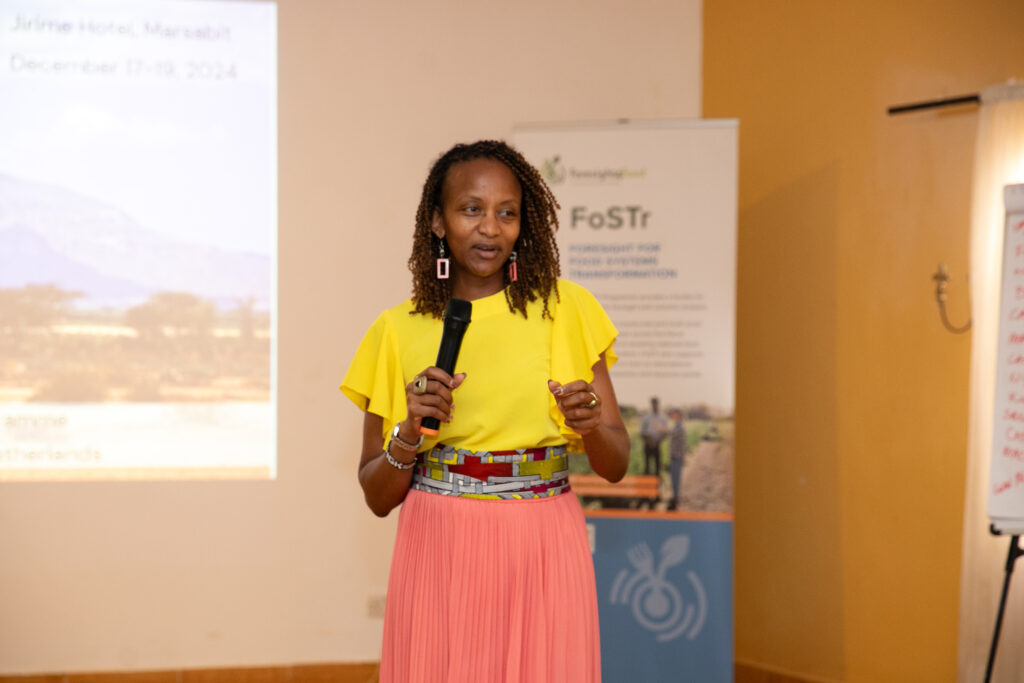
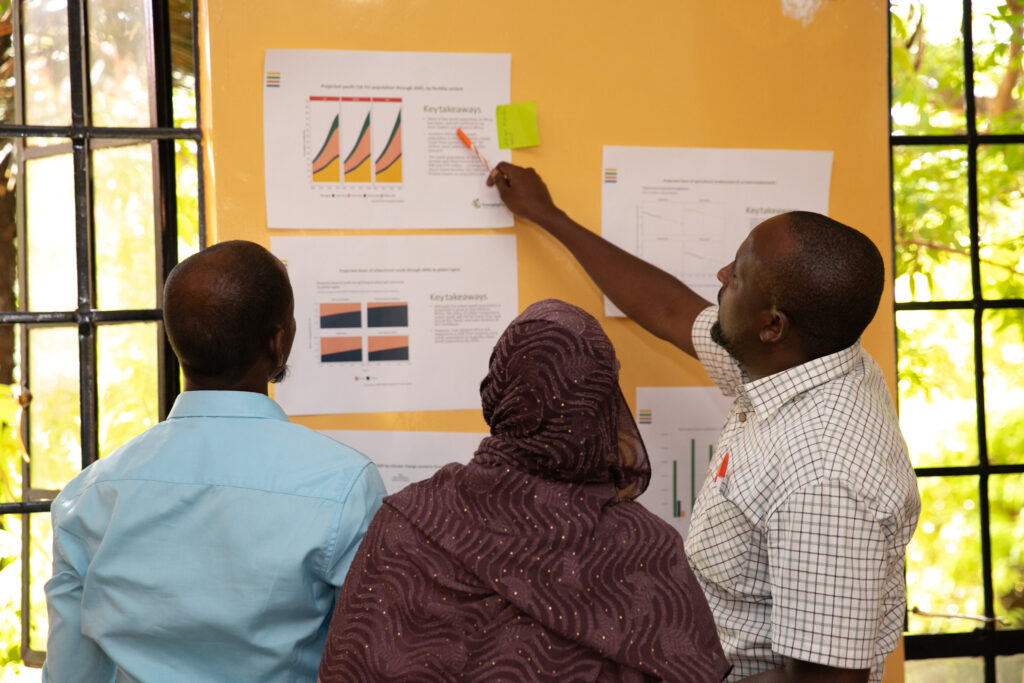
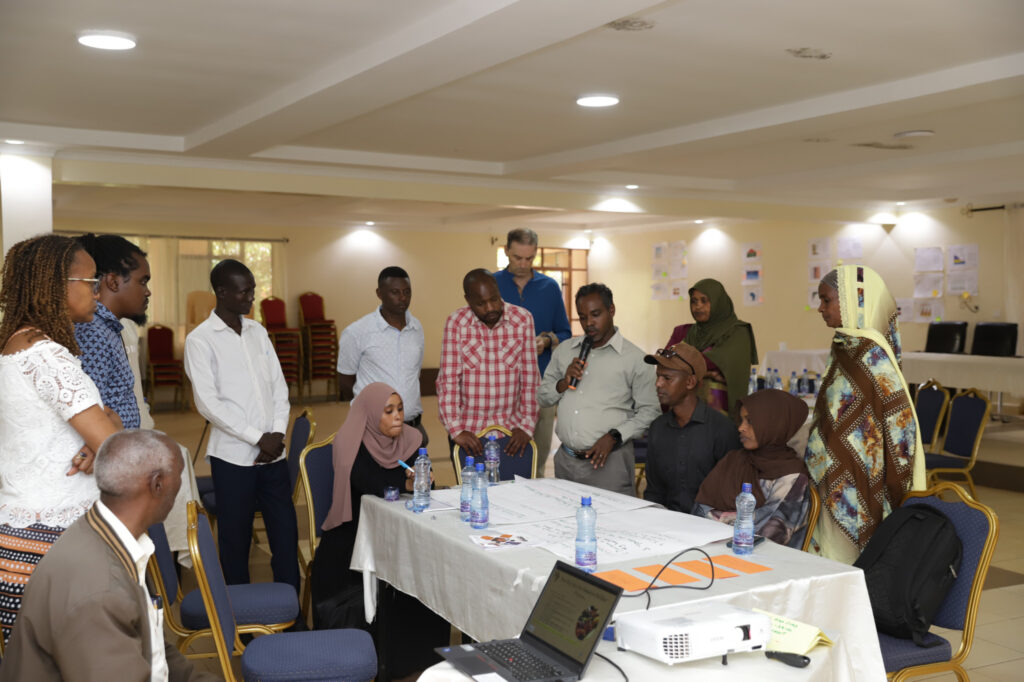
Photo credit: Crispaus Onkoba/SID, used with permission
That’s the summary of where we ended up. However, an essential detail was omitted earlier: How do you ensure the right individuals and institutions are in the room? Achieving this required a carefully planned stakeholder engagement process, which began several weeks before the workshop. The process involved numerous meetings with individual stakeholders across the county to understand who was doing what, who was most invested, what had been successful, and what hadn’t worked in the past. The ultimate goal was to mobilize the most relevant and diverse stakeholders for the 3-day workshop.
We started by engaging the county leadership, relevant government departments, and development partners. But stakeholder mobilization didn’t stop there. We actively sought out voices often overlooked in food systems discussions: faith-based organizations, community groups, and private sector representatives.
Following the workshop, we ensured the initial excitement and momentum were sustained by maintaining contact with key participants. This effort culminated in the formation of a County Development Group, coordinated by the county government. This group brings together all actors actively engaged in food security initiatives, creating a collaborative platform for sustained impact.
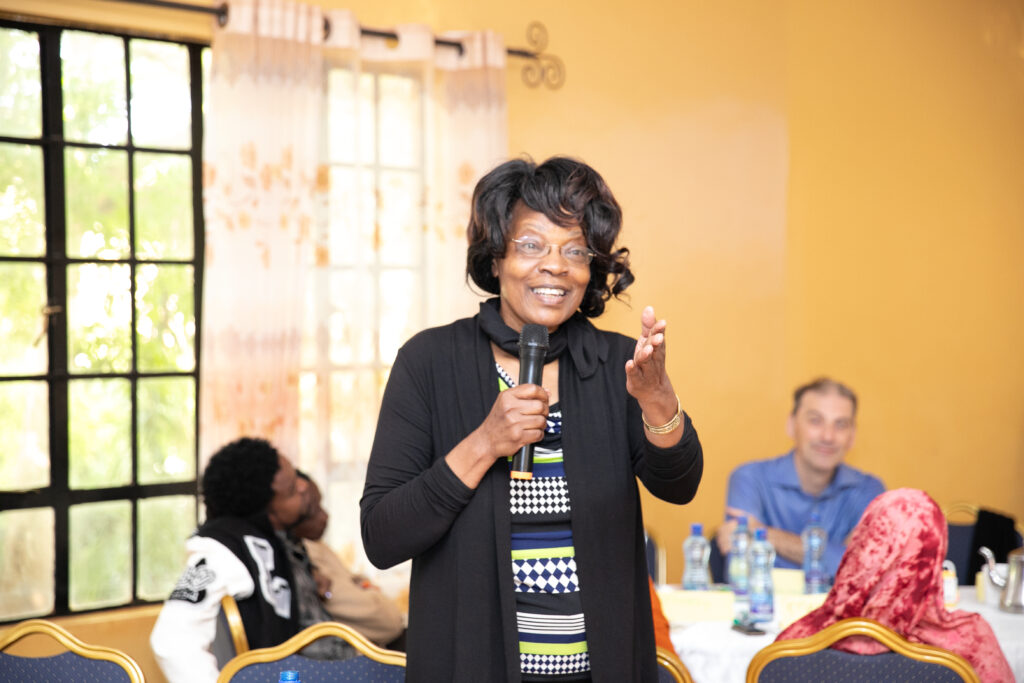
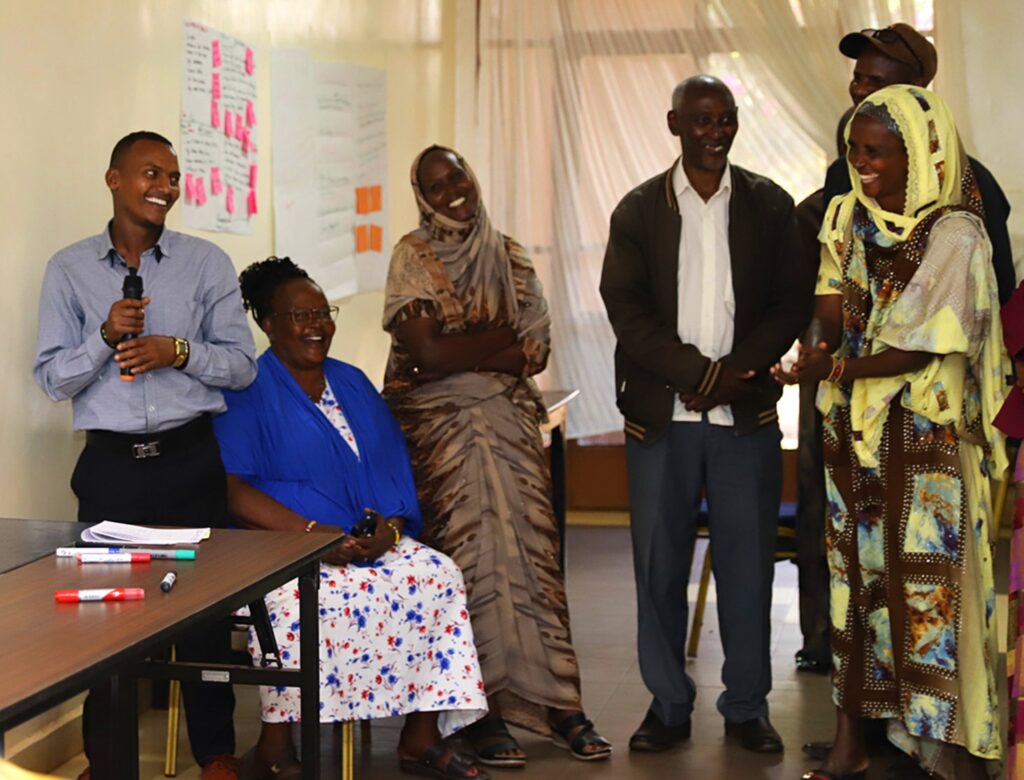
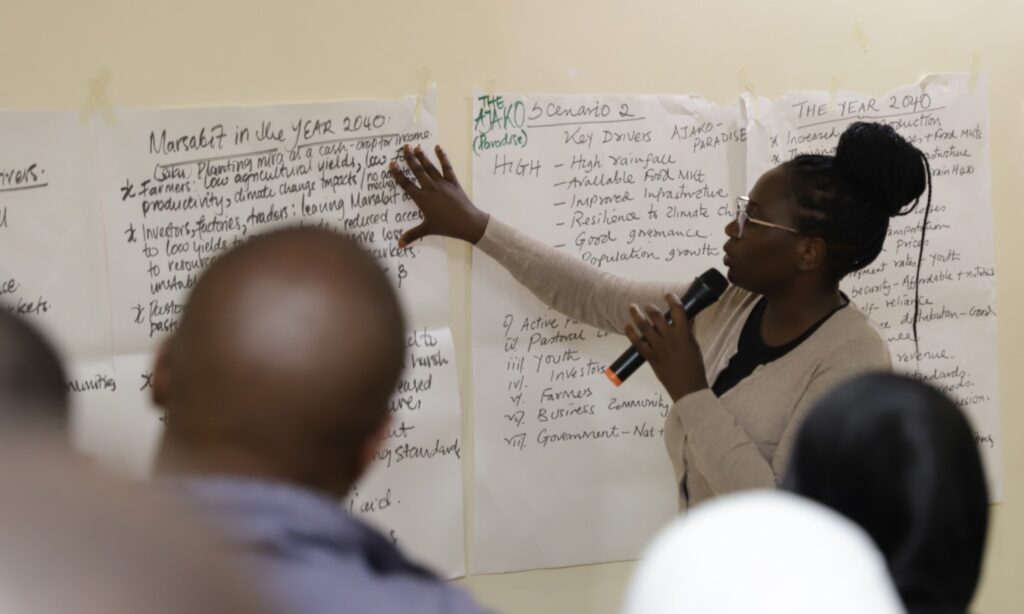
Photo credit: Crispaus Onkoba/SID, used with permission
We argue that the investment in stakeholder engagement has been the most valuable ingredient of the foresight process so far. It has allowed our Kenya foresight team to obtain the right endorsements and buy-in at the right levels. Without getting the engagement process right, all participatory foresight tools, and supportive analytics, are at risk of falling flat.
There is a case to be made to only report on foresight processes after they are concluded, rather than at the start. This blog is an exception, to make the point that how you start matters.
The FoSTr Kenya foresight team, consisting of Results for Africa Initiative (RAI); Society for International Development (SID); International Livestock Research Institute (ILRI); University of Nairobi; Food and Land Use Coalition (FOLU); Wageningen University & Research (WUR); and the University of Oxford, will continue to support the County Development Group in Marsabit to coordinate actions of state and non-state actors towards achieving Ajako by 2040. A similar process is taking place in Nakuru County. Both have active linkages to Kenya’s national food system science-policy interfaces.
The Foresight for Food System Transformation (FoSTr) programme, led by Foresight4Food, is now two years into its journey of helping shape more sustainable, inclusive, and resilient food systems. With increasing uncertainties affecting global food systems—from climate change to economic challenges—the need for foresight and scenario analysis has never been more critical.

Running from 2022 to 2025, the programme is funded by the Dutch Ministry of Foreign Affairs through an IFAD grant. Based on the approach of the Foresight Framework, the programme focuses on supporting four key countries: Bangladesh, Jordan, Kenya, and Uganda.
Since its commencement, we have seen tremendous strides in advancing the key objectives of the FoSTr programme across multiple fronts. This blog highlights the progress and impact of the FoSTr programme and the exciting path ahead.
In-Country Impact: Strengthening Foresight Processes
In each of the focus countries, national foresight processes gained momentum, engaging a wide range of stakeholders, including government bodies, research institutions, and community representatives. In total, 403 individual stakeholders participated in in-country workshops across the four countries, contributing to meaningful conversations about the future of food systems.
Here is a quick overview of FoSTr programme’s progress in each of the focus countries:
Bangladesh – Strong government buy-in has been established, with collaboration from the Ministry of Food and other key players, all contributing to the national food system transformation agenda.
Jordan – Partnerships with the Ministry of Agriculture and other government entities have positioned FoSTr as a key advisor, particularly in driving forward the work of the newly established Food Security Council.
Kenya – Foresight analysis has been particularly active at both the national and county levels, with significant involvement from the Nakuru and Marsabit County governments.
Uganda – FoSTr is closely aligned with the Uganda Planning Authority, helping develop foresight tools for future food system planning.
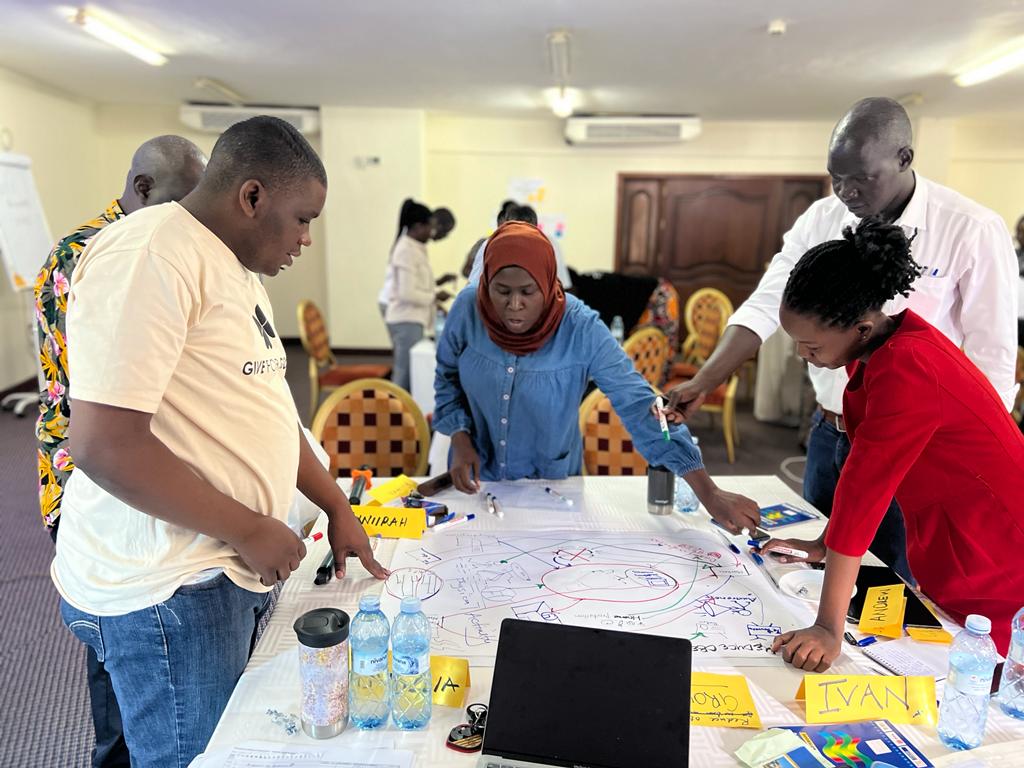
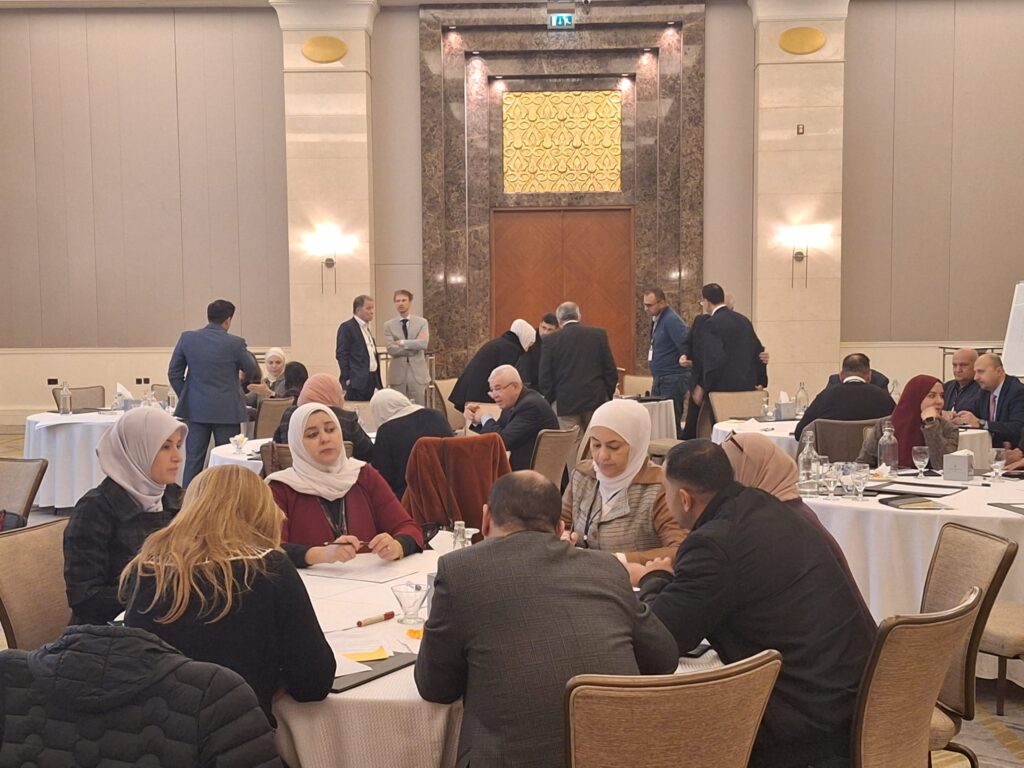
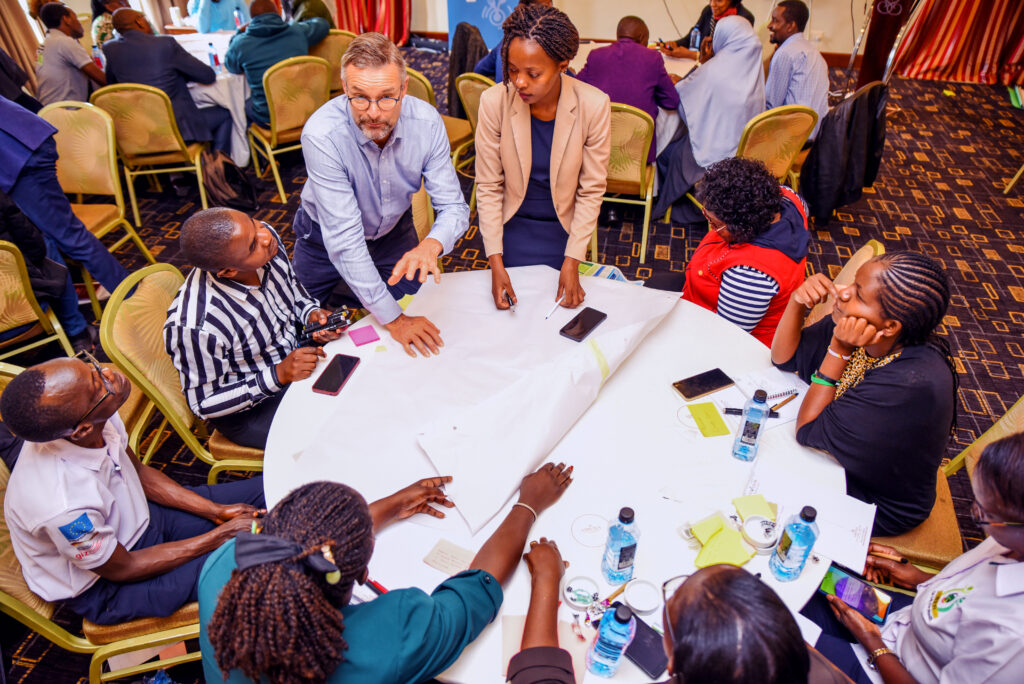
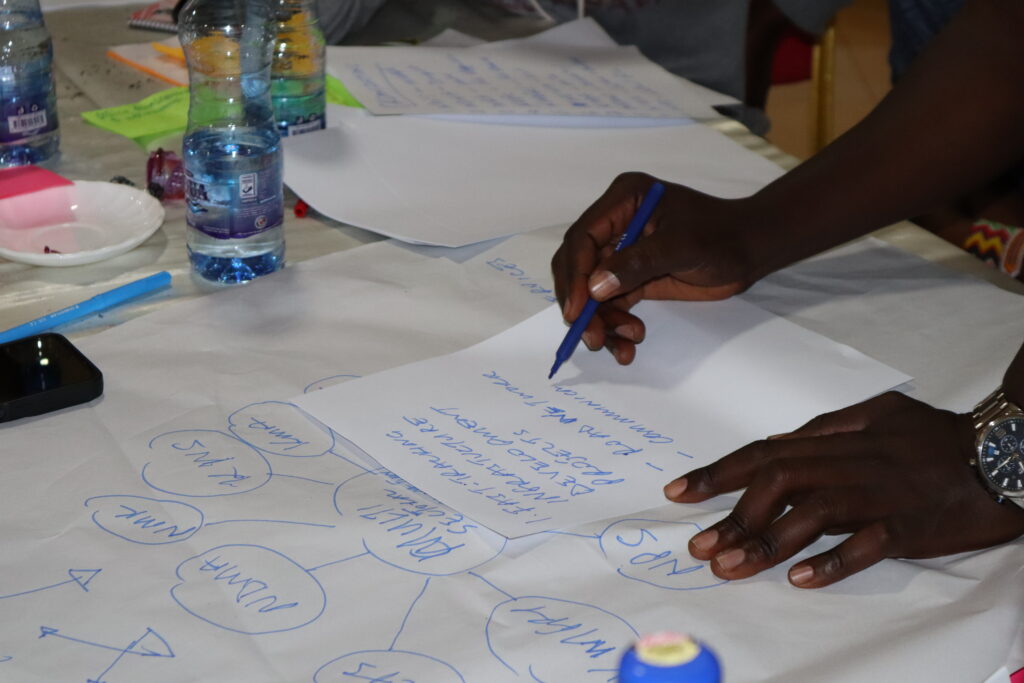


Global Collaboration: Building a Brokering Hub
On a global scale, FoSTr expanded its network of foresight and food systems practitioners, deepening collaboration across organizations like the Forum for Agricultural Research in Africa (FARA), the Global Alliance for Improved Nutrition (GAIN) in Bangladesh, and a number of renowned research institutes in the focus countries.
The work of FoSTr programme was very well-received at the 4th Global Foresight4Food Workshop in Dhaka, where more than 120 foresight practitioners from Asia, Africa, and Europe gathered to share insights on foresight methodologies and food system challenges.
Read also:
Using Foresight to Re-imagine the Future of Food Systems: Foresight4Food holds its 4th Global Meeting – by Jim Woodhill
In a highly interactive week, participants engaged in a masterclass on foresight approaches, shared their experiences and lessons, heard from thought-leaders on food systems and foresight, and identified ways of strengthening foresight practice in their own countries and regions…
A Start to the Foresight Process: Food Systems Maps
As a part of the foresight process, there is a need to have a collective understanding of the food system in different contexts. Hence, the Foresight4Food FoSTr team in collaboration with our facilitators and research partners in each focus country, created comprehensive food systems reports mapping the dynamics, trends, drivers, and activities within the food system.
These Food System Maps offer an initial snapshot of the current food system status in the focus countries and are intended to inform a more comprehensive foresight process. As the dynamics, trends, drivers, and activities within the food system continually change, these reports welcome ongoing reflection and discussion.
Knowledge Base
FoSTr also played a vital part in strengthening the Foresight4Food Resource Portal, which provides access to Foresight Studies, key data around Food System Drivers and Outcomes, a database of Foresight Initiatives, and other academic literature that helps food systems practitioners develop better Foresight Models.
The Foresight4Food Resource Portal is regularly updated with the latest research and emerging studies as well as products and resources that come out of different programme activities.
Read also:
The Complexity of Global Drivers of Food System Transformation – by Bhawana Gupta
The global food system needs to be transformed. It needs to deliver better health and improved livelihoods while protecting the environment and minimizing negative social impacts. However, there are many interconnected factors playing a role. Food Systems are complex…
Overcoming Challenges
Like any ambitious programme, FoSTr encountered its share of challenges. These included navigating political instability in some focus countries. Meanwhile, navigating the political economy of food systems—especially where entrenched power dynamics and vested interests are at play—required FoSTr to strike a delicate balance between supporting ongoing policy processes and introducing more transformative ideas for change.
The Way Forward
As the Foresight4Food FoSTr programme enters its third and final year, several key objectives will guide the remaining activities:
Brokering Foresight Processes: Continue to build connections with national stakeholders and existing initiatives, ensuring that foresight insights are integrated into policy-making and planning processes.
Capacity Building: Organize intensive face-to-face training workshops to further enhance foresight facilitation skills and broaden participation from underrepresented groups, including the private sector and youth.
Scenario Analysis and Policy Recommendations: Complete the ongoing scenario analyses and translate these into clear policy recommendations that will guide national food system transformation agendas.
Sustaining Momentum Beyond 2025: Establish sustainable communities of practice that can continue to drive foresight activities beyond the programme’s official end.
Conclusion: A Transformative Journey
In an era where global food systems are under immense pressure due to climate change, population growth, and shifting socio-economic landscapes, forward-thinking approaches are critical to ensuring food security and sustainability.
The Foresight4Food FoSTr programme has made significant headway in its mission to advance food system foresight processes in Bangladesh, Jordan, Kenya, and Uganda while building a broader global network of foresight practitioners. As we look ahead to the final year, the focus will be on translating foresight insights into action, empowering national stakeholders, and ensuring that the work of FoSTr continues to have a lasting impact on food systems worldwide.
Bonus: FoSTr Facilitators Insights
As the Foresight4Food FoSTr programme continues to foster systemic change in global food systems, the programme facilitators will be sharing their observations on the work and progress of FoSTr programme in their respective countries through insightful blogs. Watch this space and our social media channels for more updates.
By Bram Peters
The Foresight4Food FoSTr team has just returned from an active and productive trip to Kenya, despite the challenging political situation in the country. From our perspective, this highlights the need to adapt to turbulence and to use foresight to build resilience for Kenya’s food system.
From June 19 to 26, together with my team members including Jim Woodhill, Herman Brouwer, and Wangeci Gitata-Kiriga we conducted a range of food systems foresight workshops in Nairobi and Nakuru with a wide range of national food systems stakeholders. Here is a brief update on the action.
Navigating turbulence
On the morning of June 19, Foresight4Food, together with partners ILRI–CGIAR, Results for Africa Initiative and University of Nairobi, organised two sessions in Nairobi. The interactive breakfast session was all about ‘Navigating agri-business in turbulent futures’. The session was co-hosted by IFAD Kenya and was attended by a range of private sector associations, business support services, innovation facilitators and impact investors.
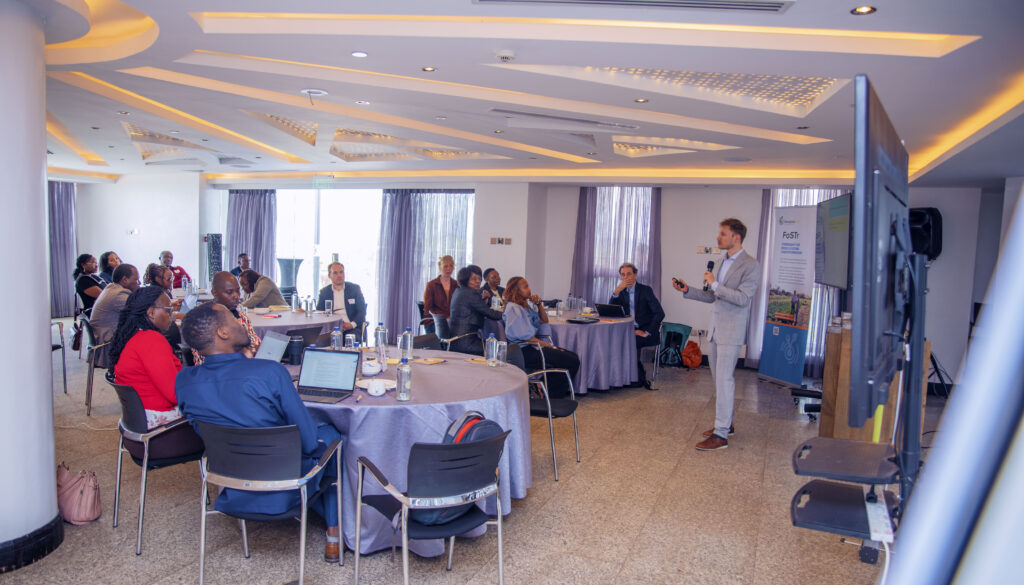
The focus of the meeting was to introduce the topic of foresight in relation to agribusiness in Kenya, share some of the scenarios that were developed in the context of Nakuru, and discuss the implications of different futures of the food system. Participants were shown five different scenarios of how the food system might look in 2040 in Nakuru and were invited to think through and discuss the implications of these scenarios.
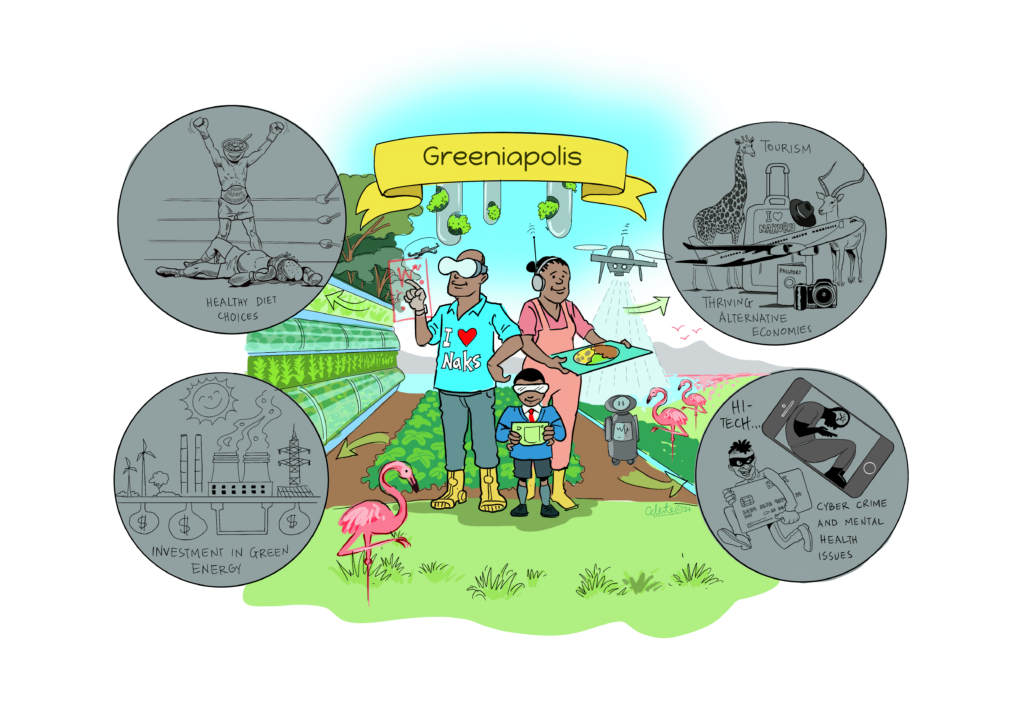
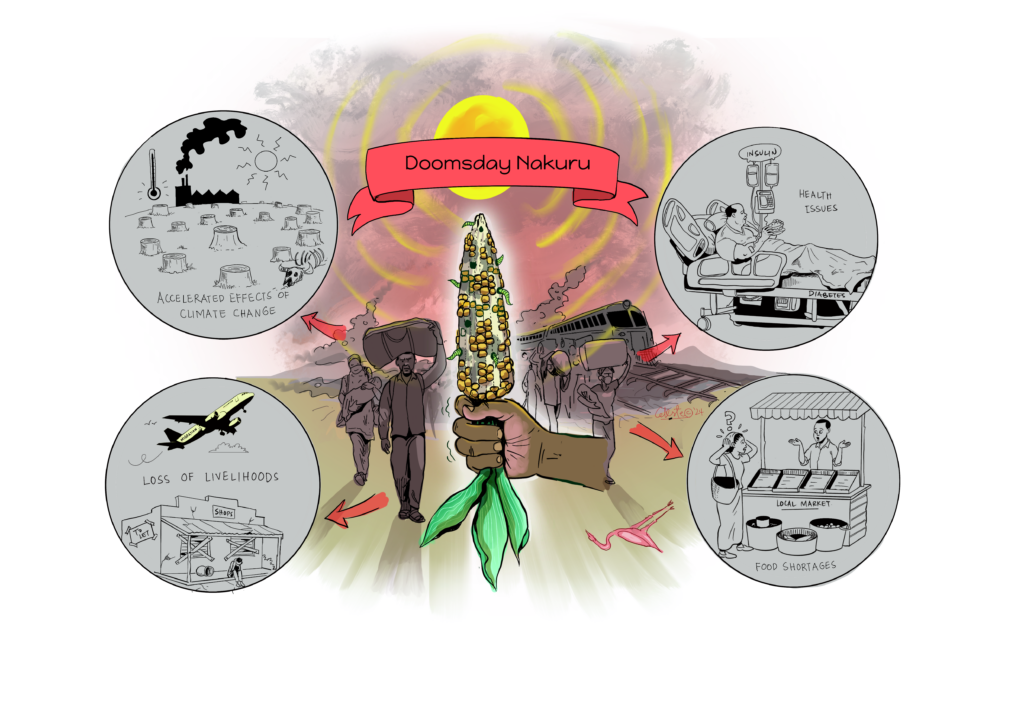
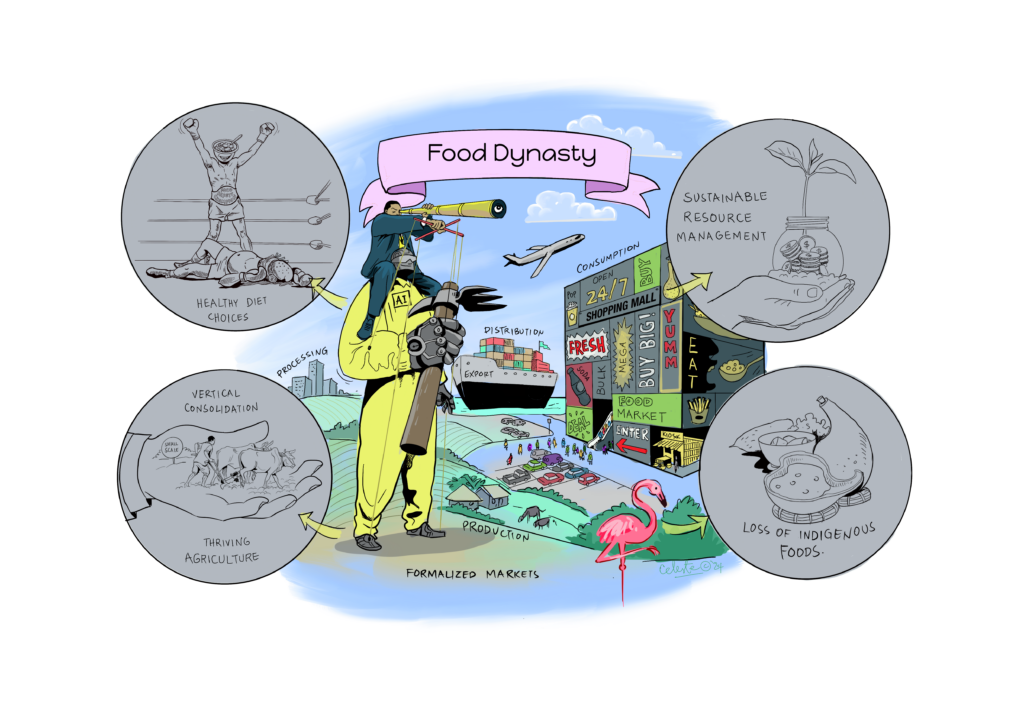
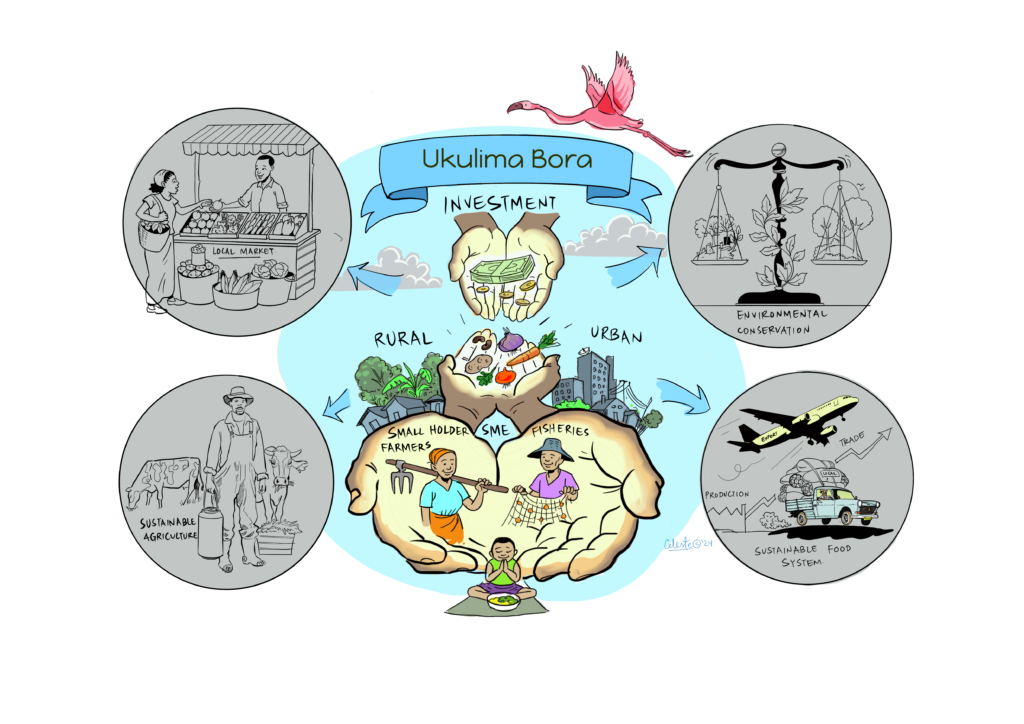
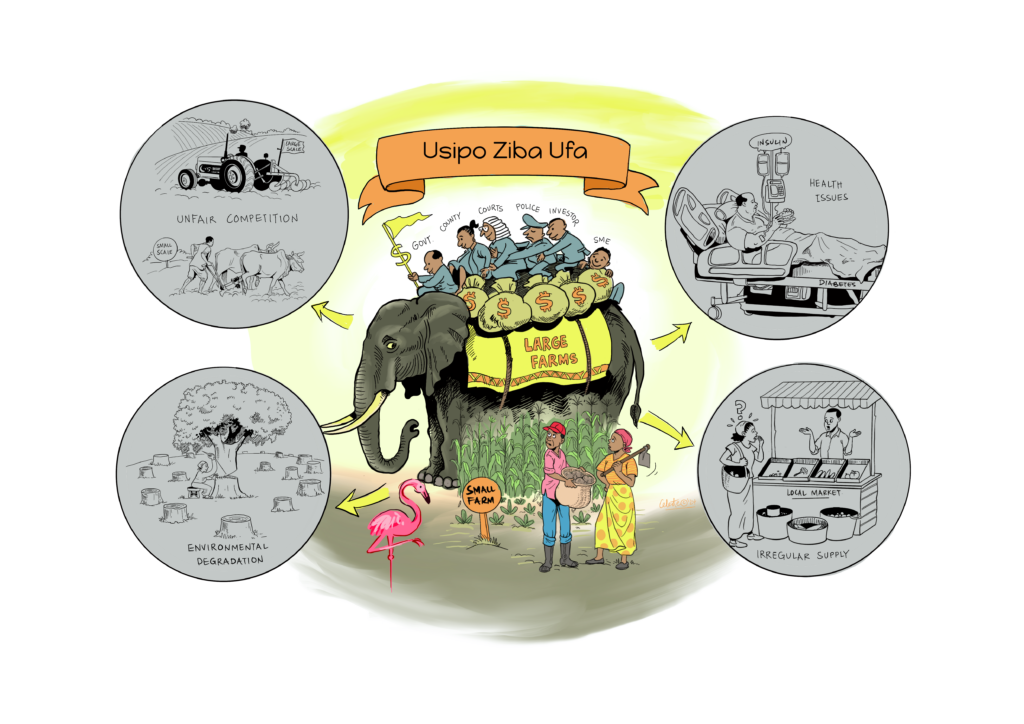
With a strong presence and involvement of leaders from various private sector associations such as the Agriculture Sector Network (ASNET) of the Kenya Private Sector Alliance, the discussion invited stakeholders to reflect not only on trends and uncertainties emerging in Kenya, but also how their own businesses are preparing for the future.
Supporting the pathways for food system transformation
In the afternoon of June 19, the FoSTr team organised a national update session on the progress of FoSTr since June 2023. The session was attended by many individuals from the morning session, as well as representatives from government, civil society and research organisations. The FoSTr team presented the latest updates, including the launch of a ‘Kenya Food Systems Mapping Report’, and with a collection of scenarios for the Nakuru food system.
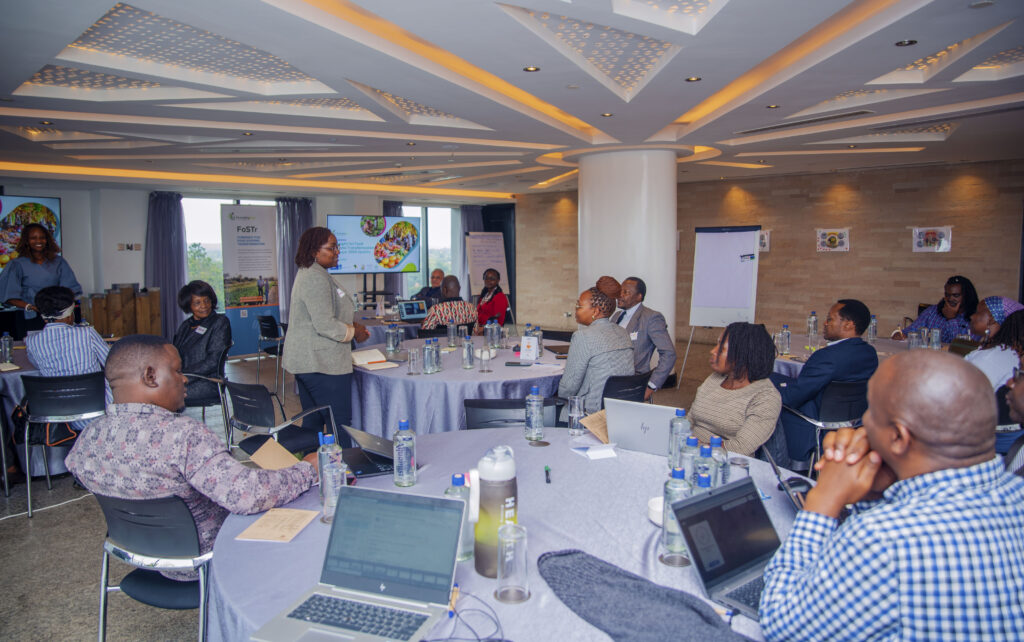
With a special presentation by the Ministry of Agriculture and the Food Systems Technical Working Group and special remarks from IFAD on the 3FS tool, it was discussed how a wide range of ecosystem support initiatives are buttressing the national food systems transformation pathways in Kenya. The approach by Foresight4Food to engage with two counties, Nakuru and Marsabit, and to build on Bottom-up initiatives showed how our approach complements the ongoing national-level initiatives.
Systemic Theory of Change
From June 19 to 21, the Foresight4Food FoSTr team facilitated a 3-day workshop for the inception phase of the new Netherlands-funded, World Food Programme and UNESCO on ‘Sustainably Unlocking the Potential of Lake Turkana. Stakeholder representatives from the Lake Turkana region (both on the Marsabit and Turkana sides of the lake) gathered in Nairobi to engage in a shared analysis of the complex food system and co-create the high-level focus of the programme.
The Turkana Lake food system is highly complex, with high food insecurity, vulnerability to climate change and conflict, and many cultural dynamics around pastoralist and fisheries livelihoods. Finding market opportunities and strengthening resilience is not easy, and requires a different way of working. Using the Foresight4Food approach, and building on 6 scenarios that were developed in previous workshops in Marsabit and Turkana, stakeholders explored what might need to be done to understand systemic risks and how lasting opportunities can be triggered.
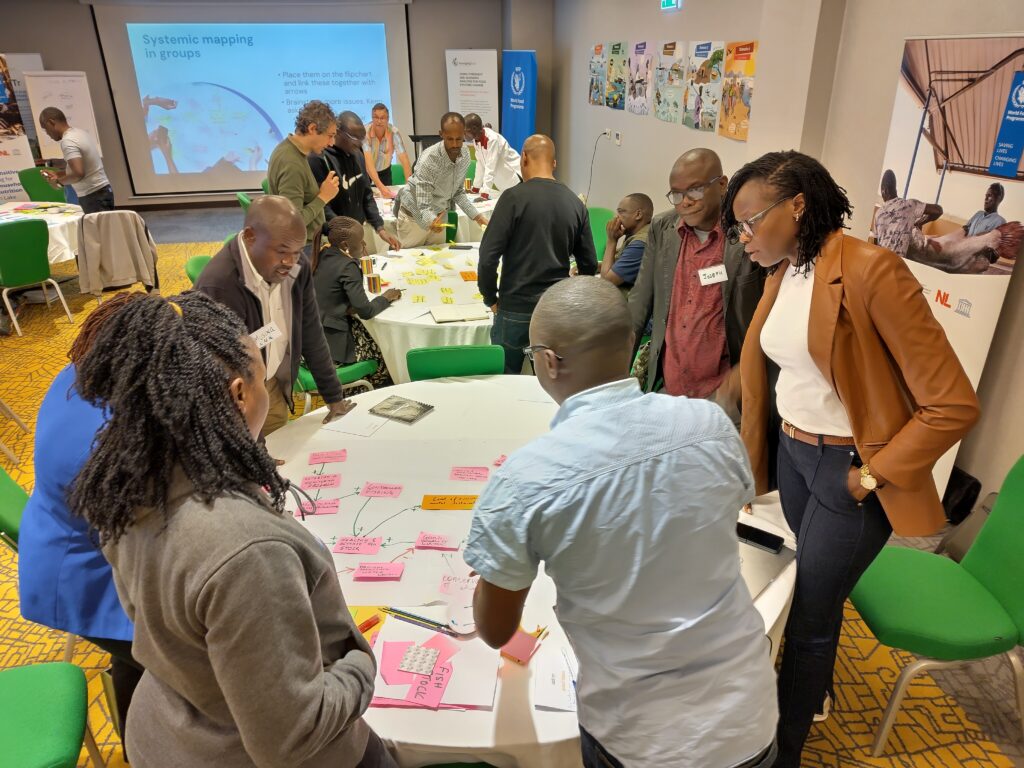
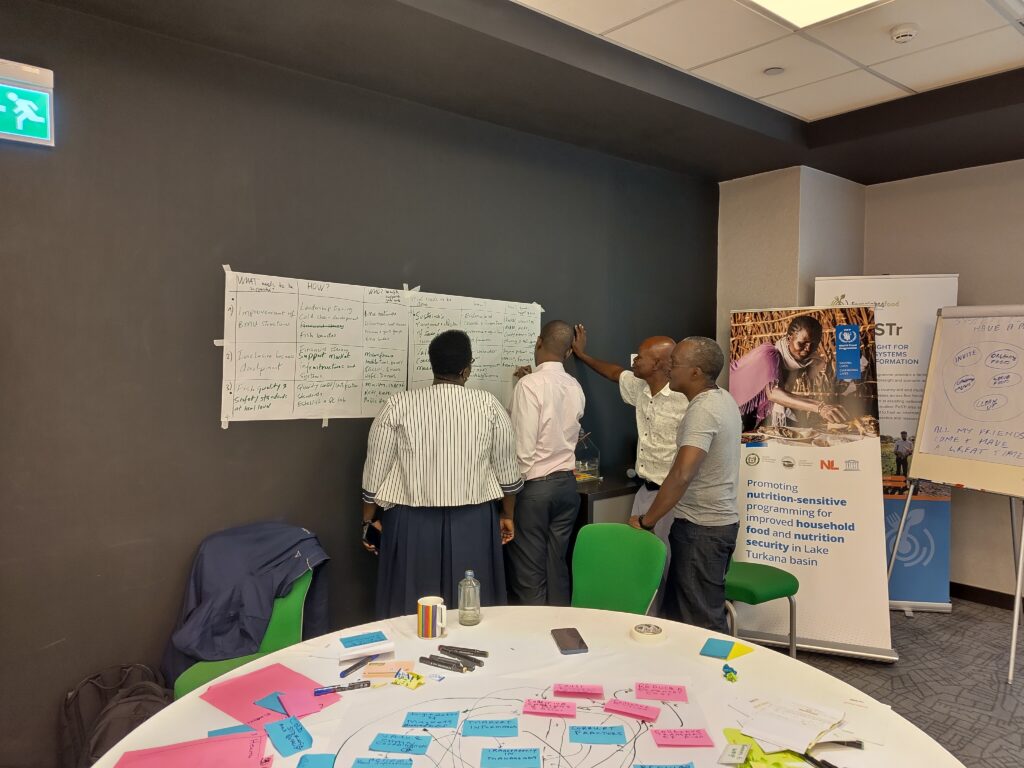
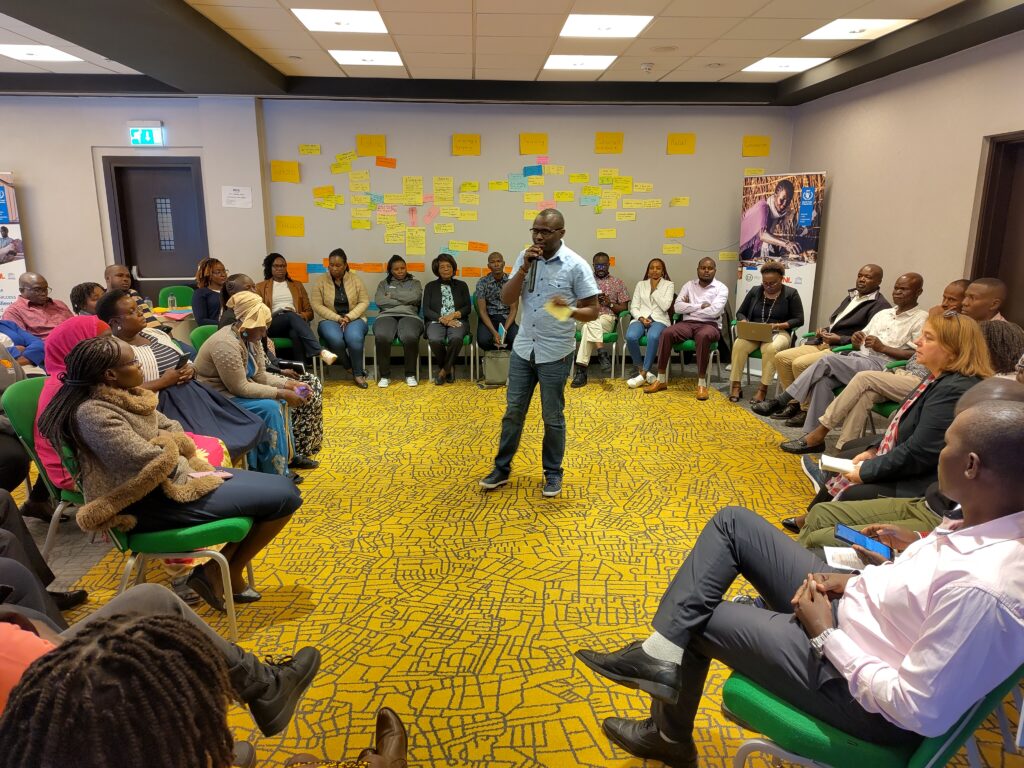
Preparing a Systemic ToC is all about analysing the context, articulating the transformations needed in light of various future scenarios, and developing the building blocks for action. The building blocks include pathways, processes and partnerships. Through many interactive discussions and exercises, the stakeholders conducted value chain mapping of the fish value chain, CATWOVE for articulating systemic change narratives, and Causal Loop Mapping.
Manifesto for Change for the Nakuru Food System
On June 24 and 25, the FoSTr team including partners ILRI-CGIAR, Results for Africa Initiative and University of Nairobi once again visited Nakuru, now to explore systemic change pathways. As we already noted from previous workshops, the food system of Nakuru County is full of potential, as Nakuru’s natural resources are rich and a wide range of agricultural value chains are represented. However, challenges related to food and nutrition security and environmental sustainability exist. Trends of climate change, unhealthy diets and land fragmentation are appearing. The future holds many uncertainties. In order to future-proof the food system, it is urgent that investments are made to further enhance the resilience and sustainability of food and agriculture in Nakuru.
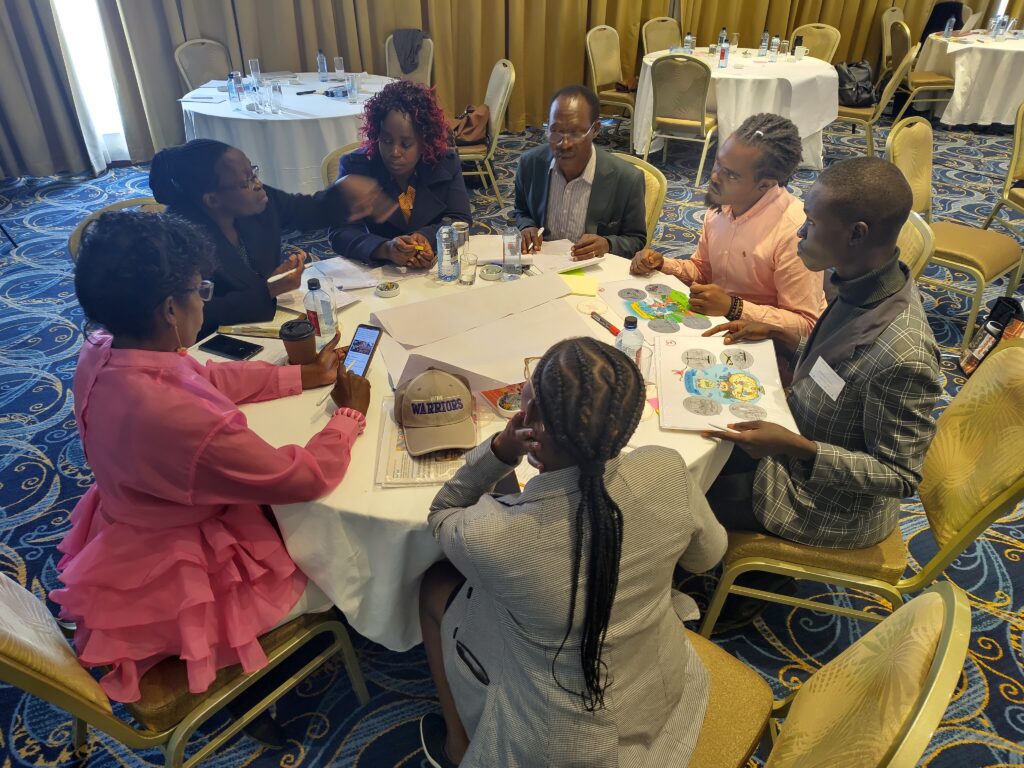
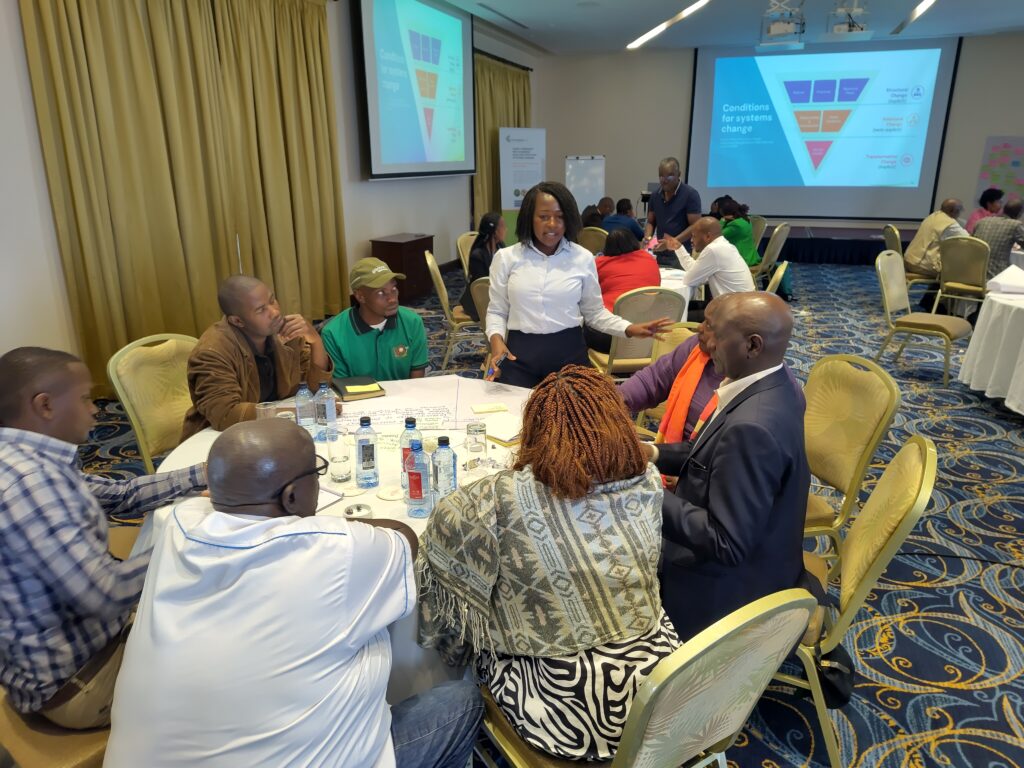
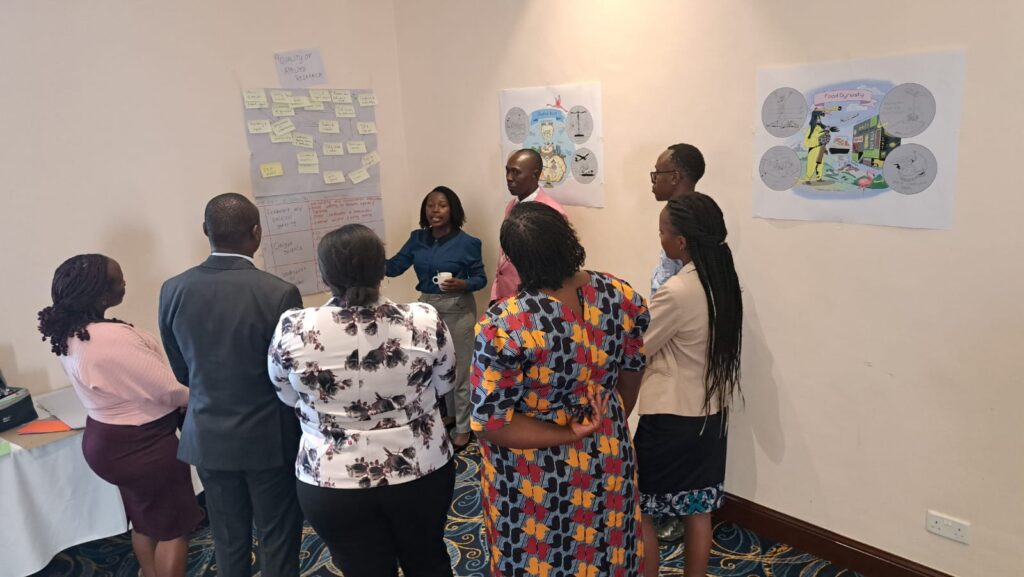
Since November 2023, a diverse group of more than 40 different stakeholders from Nakuru county have been coming together to consider the future of food system, supported by researchers and facilitators of Foresight4Food. This inclusive group looked at the challenges and opportunities for food and agriculture today and how they might evolve in 10-15 years. Food system analysis, an assessment of drivers and trends relevant to Nakuru, and 5 scenarios were developed by this group.
During these two days, stakeholders from Nakuru engaged in scenario interpretation and Causal Loop diagramming to come up with key pathways to kickstart food system transformation in Nakuru. These outputs culminated in a Manifesto for Change: a vision for the desired future for Nakuru’s food system and a range of possible pathways that can set us in that direction, while preparing us for a range of uncertainties. The Manifesto calls upon all stakeholders to join and align their actions, and intensify collaboration to transform Nakuru’s food system so that it can feed its people nutritiously; advance economic development; restore balance with nature; grow in-county revenue and eventually GDP growth for Kenya.
By Zoe Barois
Over the past year, the Foresight4Food Foresight for Food System Transformation – FoSTr team and our country partners have begun a foresight process in Jordan, Uganda, Kenya, Bangladesh, and Niger to support national food system transformation. As an initial step, a collective understanding of the food system in different contexts was needed. Hence, the Foresight4Food team in collaboration with our facilitators and research partners in each focus country, created comprehensive food systems reports mapping the dynamics, trends, drivers, and activities within the food system.
Being a lead on food system mapping, I’m sharing my reflections on the process in this blog.
We started with a scoping phase using the Foresight4Food foresight framework, which allows for flexibility and contextual adaptation. This phase involved identifying key stakeholders, understanding their interests, and assessing current and future concerns.
Our next goal was to foster a shared understanding of the food system’s key dynamics, outcomes, drivers, and activities to identify trends and uncertainties. This collective understanding forms the foundation for a participatory process using foresight and scenario analyses to support meaningful food systems change.
The second step, system mapping, was done in collaboration with country facilitators and research teams. We used the Foresight4food framework to identify key food system outcomes, activities, and drivers, considering their interaction with the broader environment. Data were compiled from national and global sources and generated through participatory workshops.
In addition to providing an overview of current status and trends, we conducted a deeper analysis using causal loop diagrams created with research partners during workshops. This approach helped identify trade-offs and synergies, informing actions to improve food system outcomes. We also noted recurring patterns that affect feedback loops, further clarifying the system’s structure.
These reports offer an initial snapshot of the current food system status and are intended to inform a more comprehensive foresight process. As the dynamics, trends, drivers, and activities within the food system continually change, these reports welcome ongoing reflection and discussion.
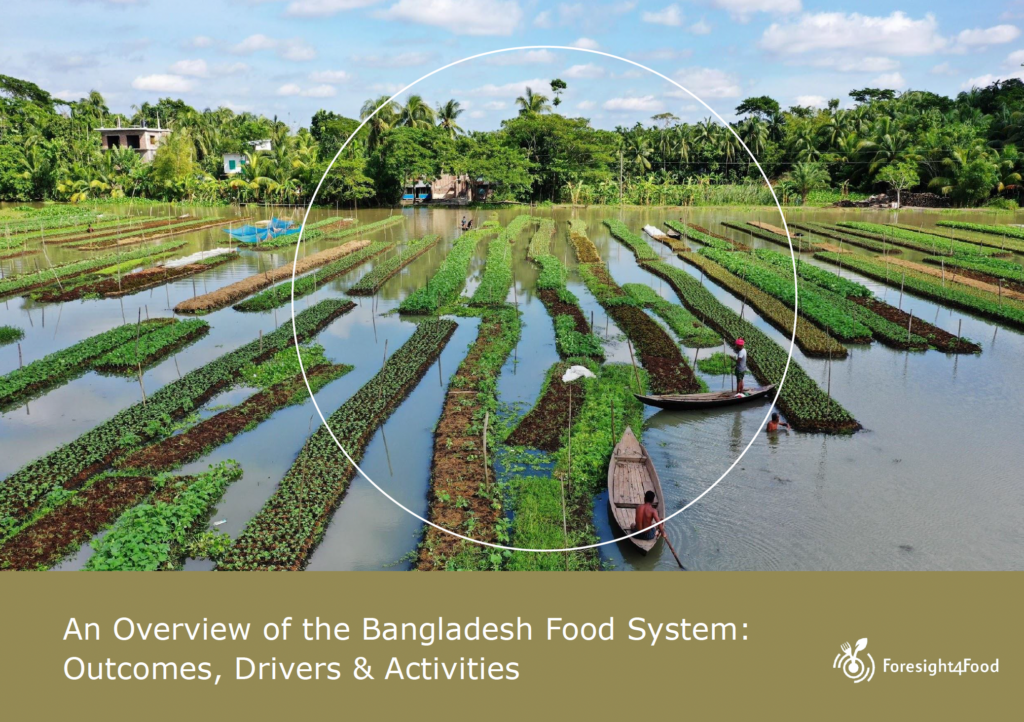
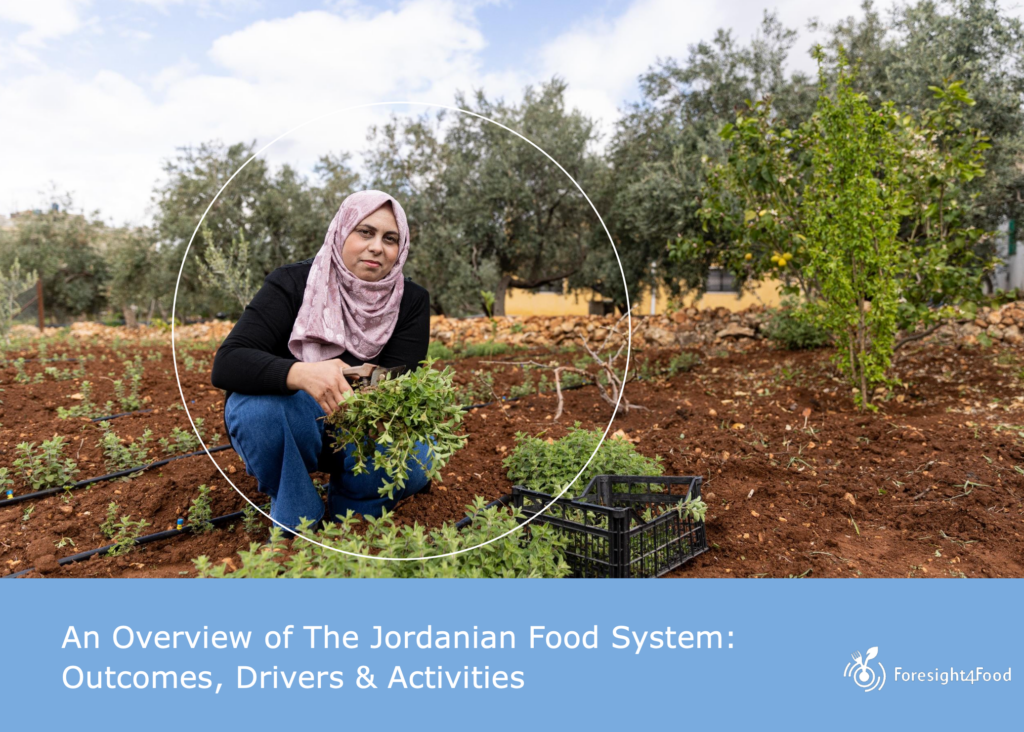
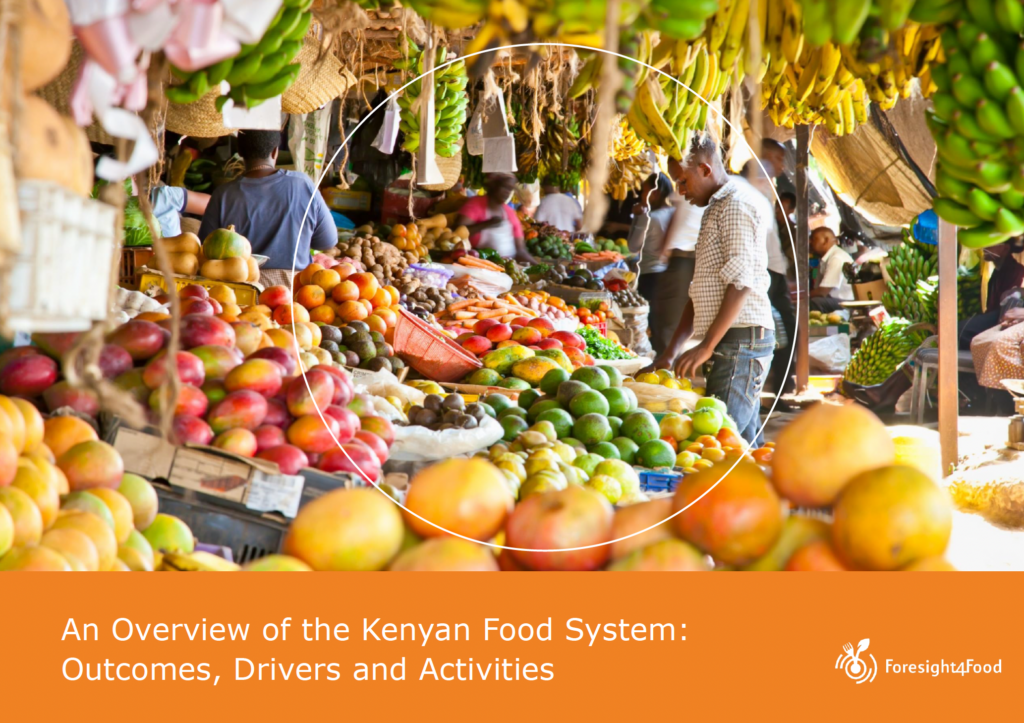
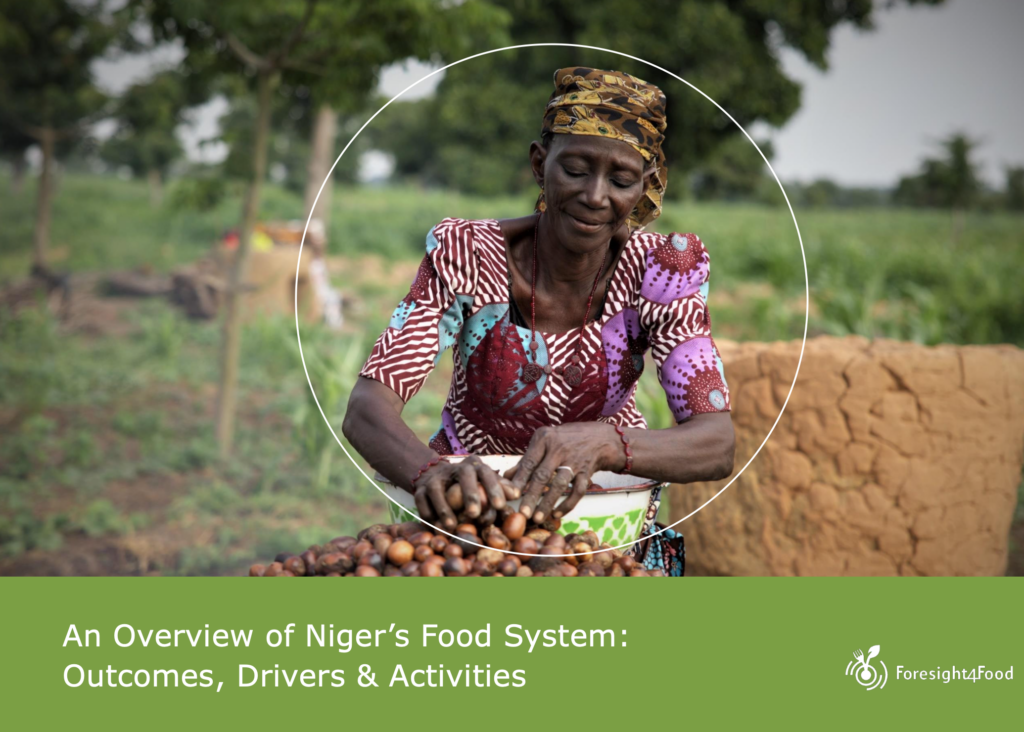
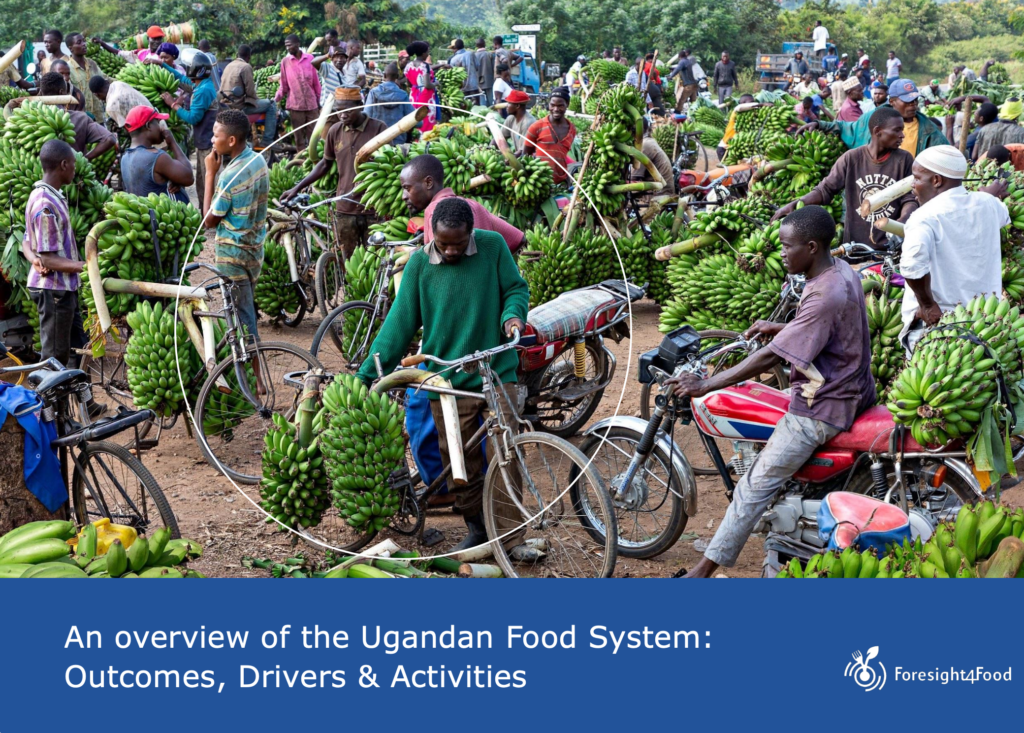
Read and download reports
By Bram Peters – Food Systems Programme Facilitator, Foresight4Food
In the north of Kenya, on the border with Ethiopia, the landscape is expansive and dry. Pastoralism is the main source of livelihood, but to the west of this landscape is Lake Turkana, one of the largest saline desert lakes of the world. Here communities engage, some productively and others reluctantly and out of desperation, in fishing.
In March 2024, the Foresight4Food FoSTr team traveled to the fascinating Kenyan county of Marsabit to facilitate a multi-stakeholder forum to support the co-creation of the new ‘Sustainably Unlocking the Economic Potential of Lake Turkana’ programme.
In Marsabit, stakeholders from around the Turkana Lake, including fishers, traders, service providers, county government technical officers, and non-governmental organizations, came together to analyze the context and co-create future scenarios and intervention areas for a new WFP and UNESCO programme, funded by the Embassy of the Kingdom of the Netherlands.
Together with the World Food Programme and the World Food Programme Innovation team, the FoSTr team held a highly interactive and productive three-day workshop. As most stakeholders mainly spoke Kiswahili, we switched to short presentations with much emphasis on interactive group work. On the first day, the workshop focused on contextual understanding of the Lake Turkana food system as well as the Marsabit county livelihoods, using the Rich Picture mapping exercise. Participants together drew the food system, the geography of the lake, but also the stakeholders, activities, key relations and dynamics.
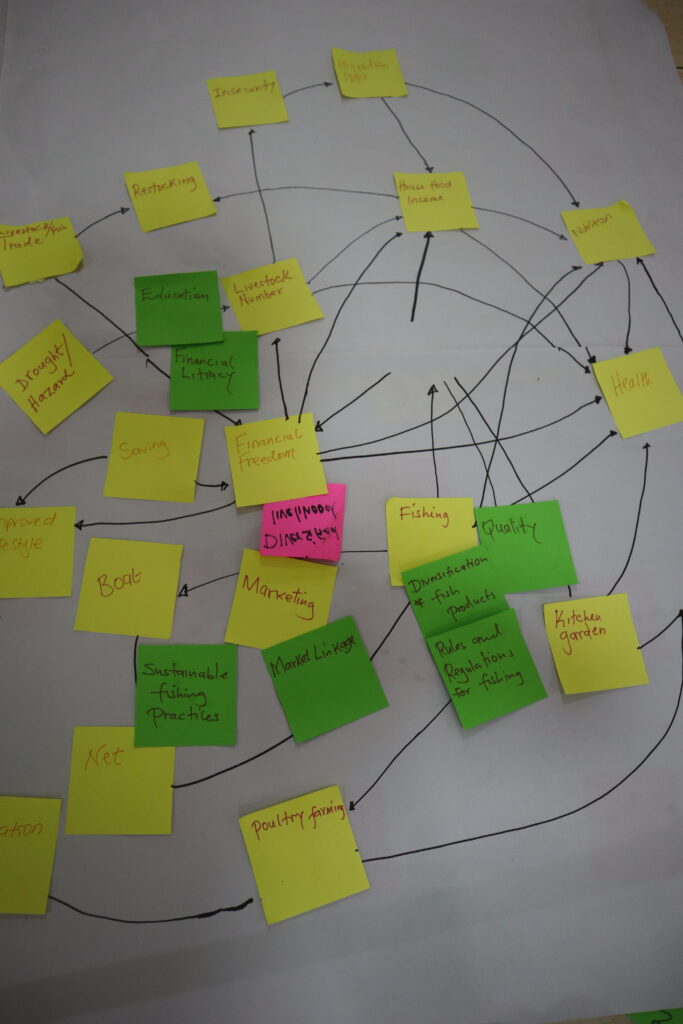
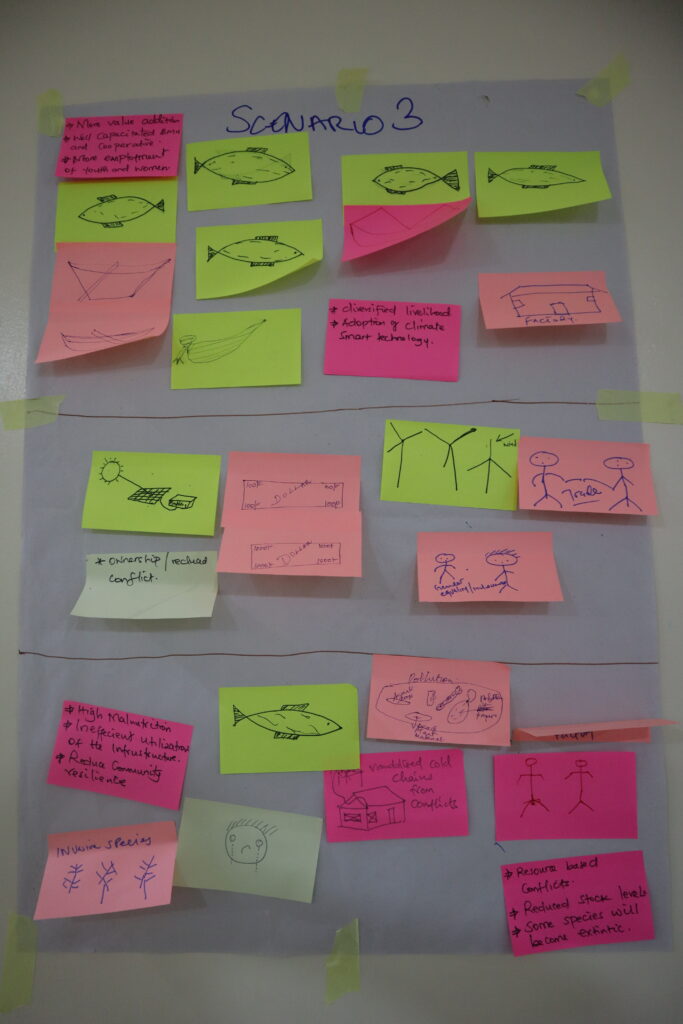
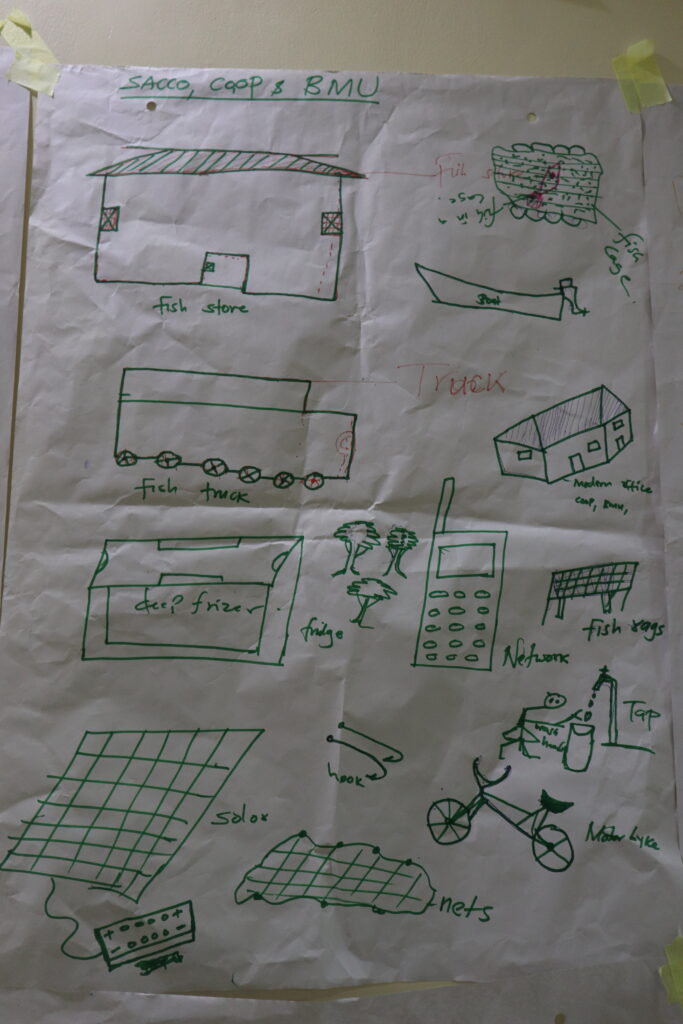
On the second day, the groups presented their deep knowledge of the context to each other and elaborated on this. Workshop participants tackled key trends shaping the food and livelihoods system: groups discussed how various themes (for example: lake water levels, fish stocks to income sources, conflict, and education) changed over time and what they expect to happen 10 years into the future. Important in this discussion is their analysis of what driving issues would influence change in the future.
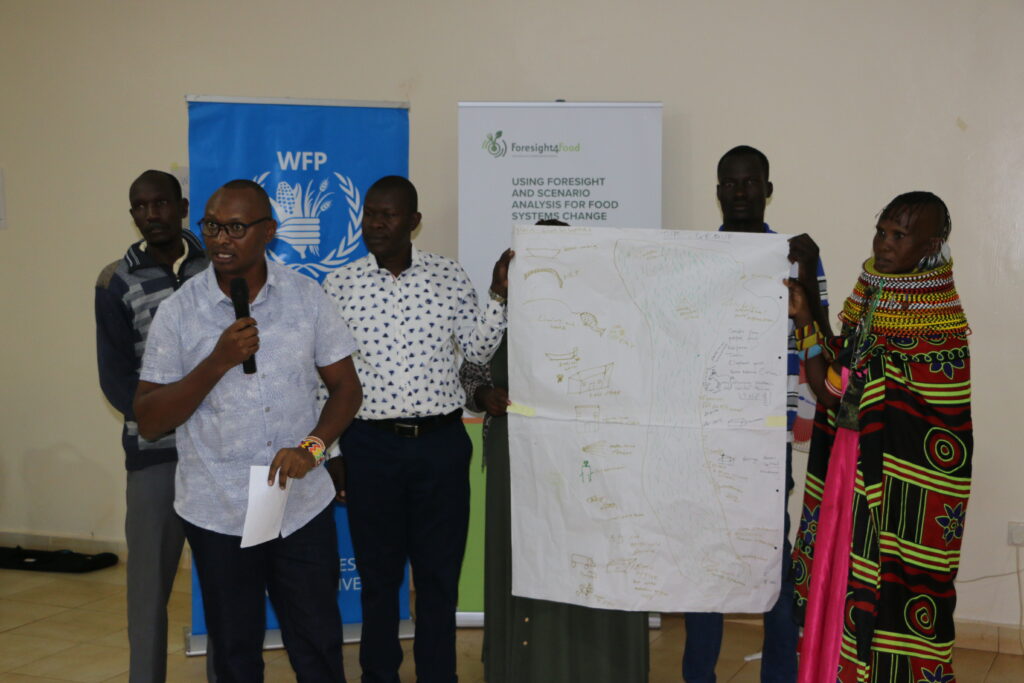
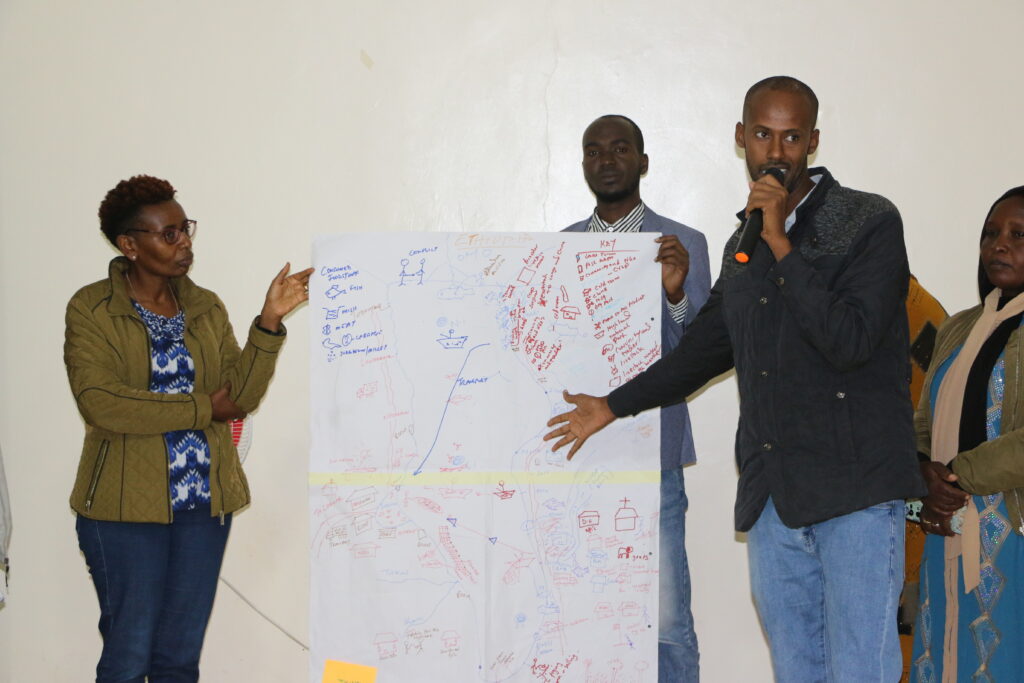
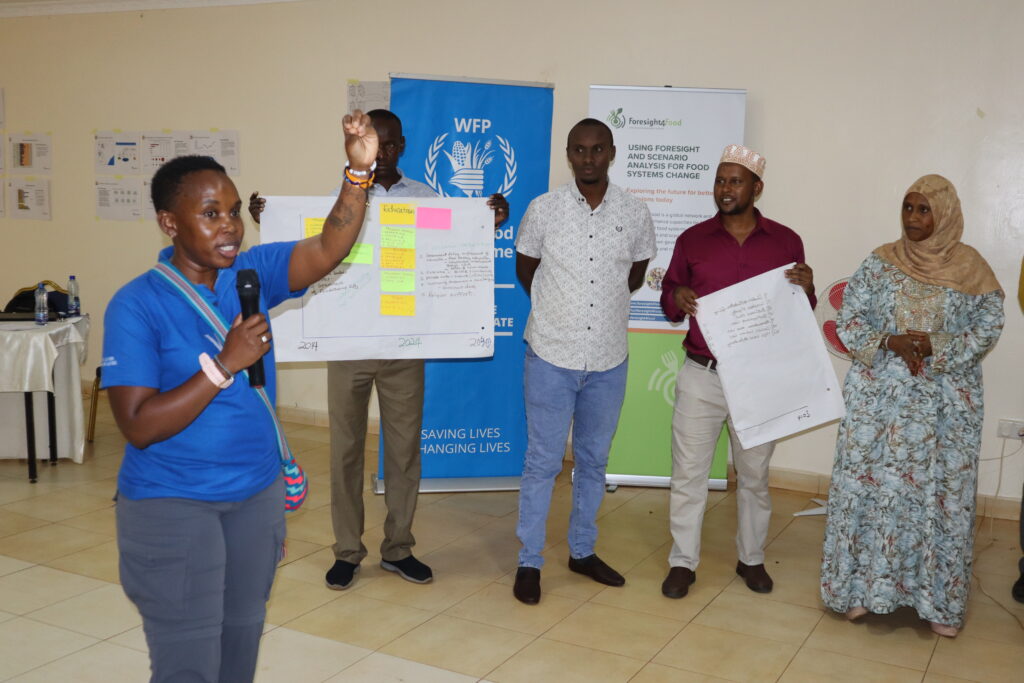
5 scenarios were created for the future regarding the fisheries sector and supporting livelihoods, as well as an in-depth discussion on key entry points for intervention in the system. These scenarios had names that described these futures succinctly:
- ‘Tumaini Paradiso’, a future with a growing fishing sector, inclusive benefit sharing and sustainable natural resource management;
- ‘No retreat, no surrender’, a situation in which the benefits of a growing fisheries sector are controlled by a few;
- ‘Short gain, long pain’, a scenario where the fisheries sector grows and livelihoods improve around the lake, but the environment is not maintained;
- ‘Gasping blue economy but others rise’, is a future where the fisheries sector remains marginal for communities, but other sectors are developed that also contribute to inclusive development and environmental sustainability
- ‘Darkness in life’, a bleak outlook where none of the envisioned sustainable economic development around the lake delivers and where climate resilience is low, and conflict is rife.
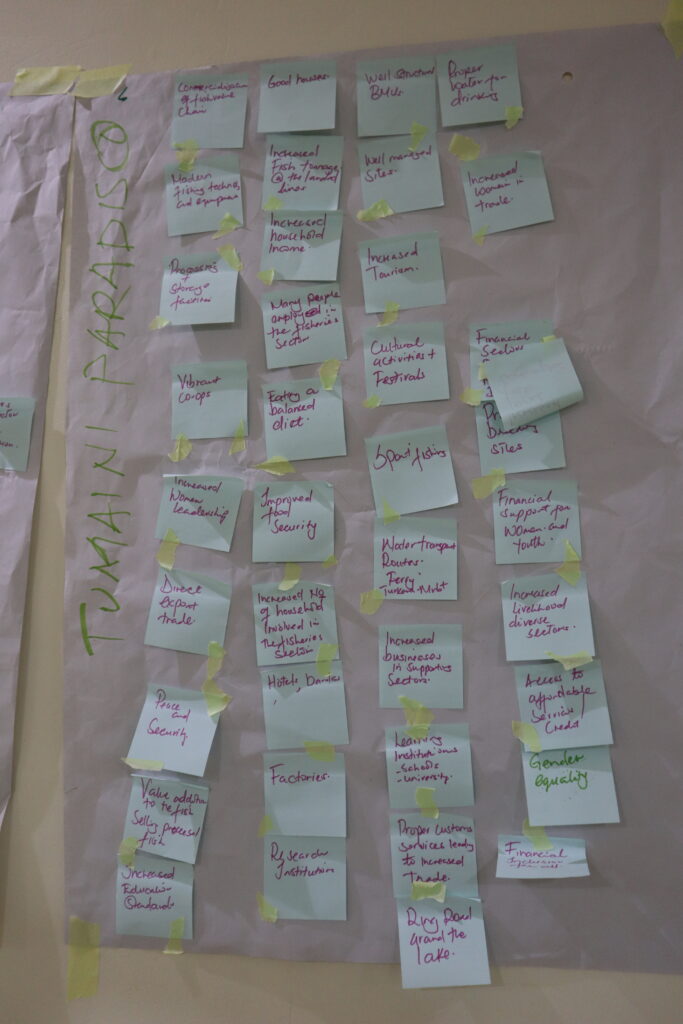
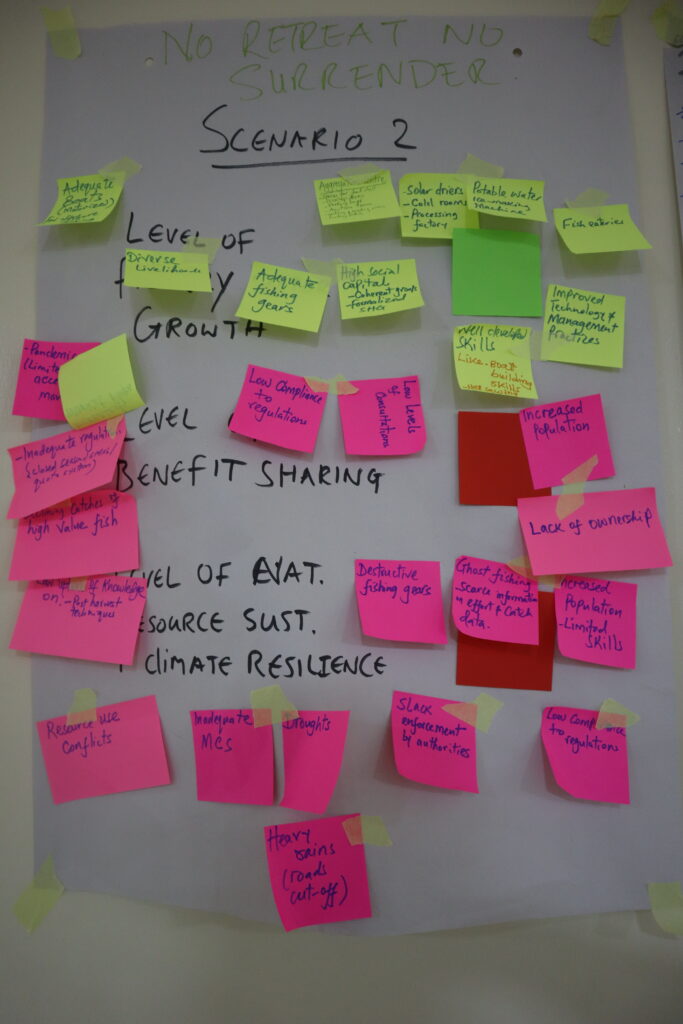
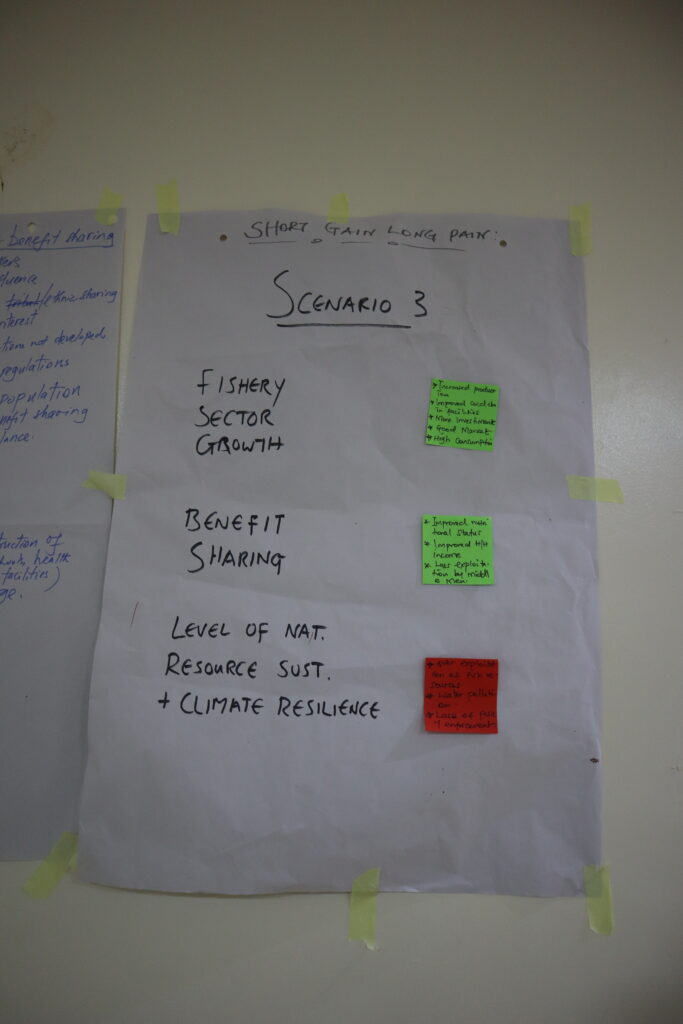
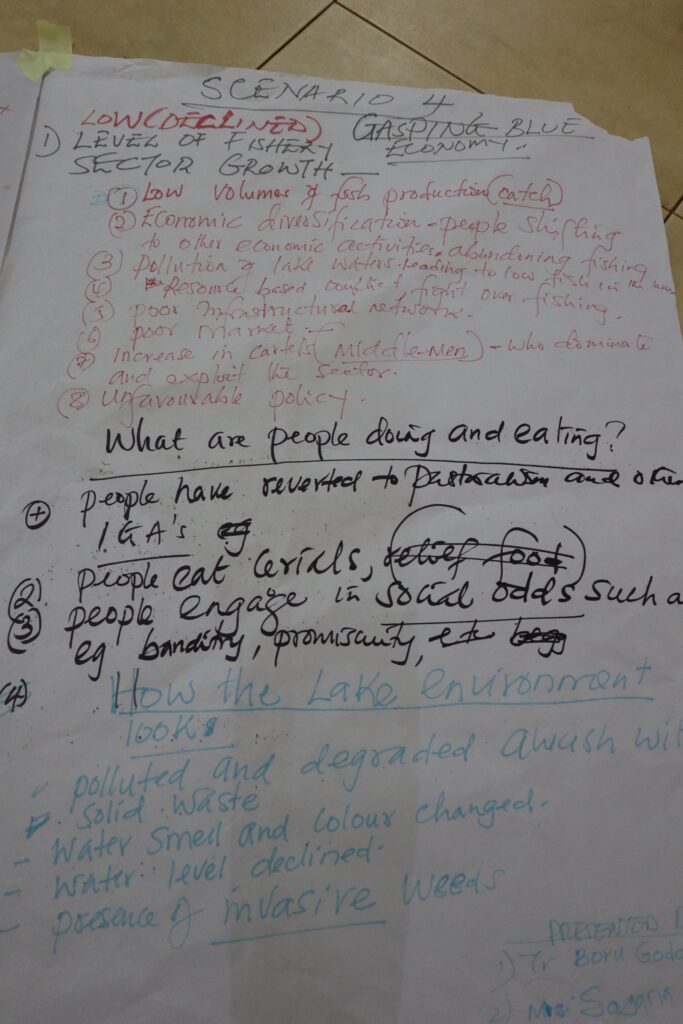
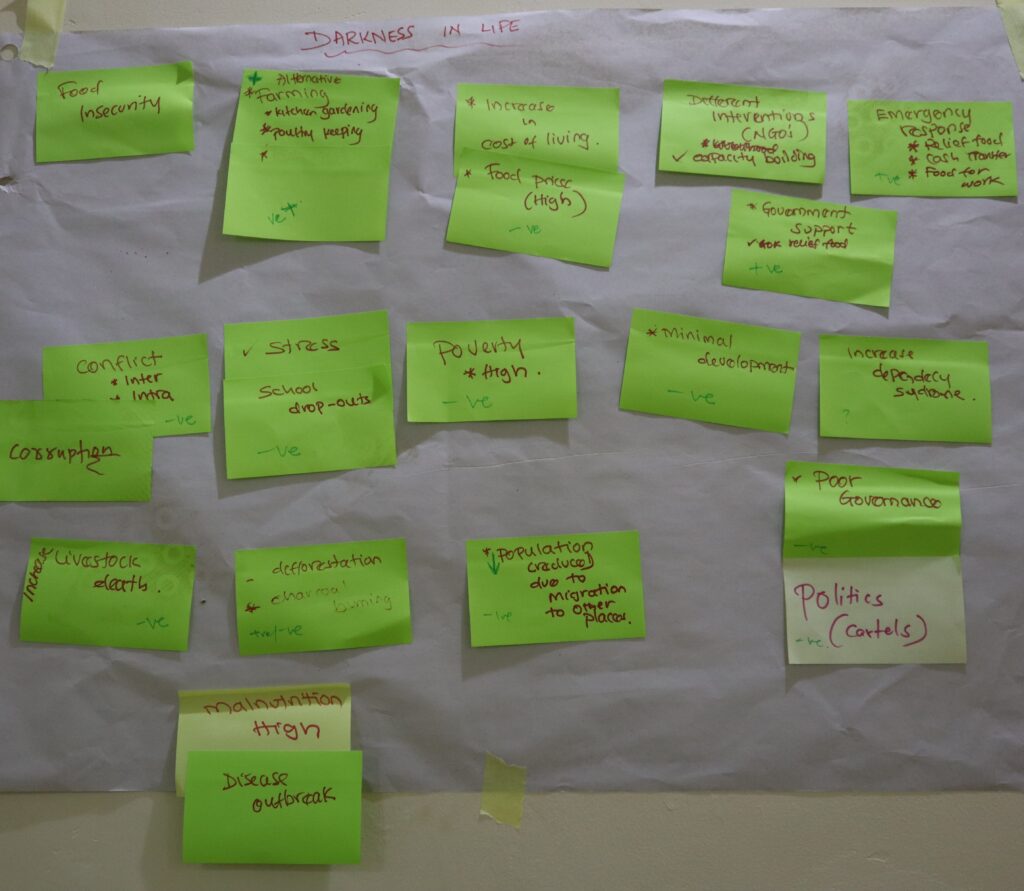
Different stakeholders participating in the workshop had different opinions on the likelihood of certain scenarios emerging. Some imagined the situation worsening, while a few viewed the future more positively. These reflections clearly showed a combination of outlook of participants as well as the signals they interpret from the current situation and the trends seen now. Interestingly, none of the stakeholders felt the ‘Paradiso’ scenario was likely, showing that the programme needs to be modest in its systemic ambitions, but also be ready to do things very differently. These scenarios showed what could become a very relevant frame of reference to the stakeholders as well as the programme implementors.
On the last day of the workshop, participants explored a common vision for the future, and how the food system is currently working. This led stakeholders to have a first try at exploring what is needed to change that system toward the common vision.
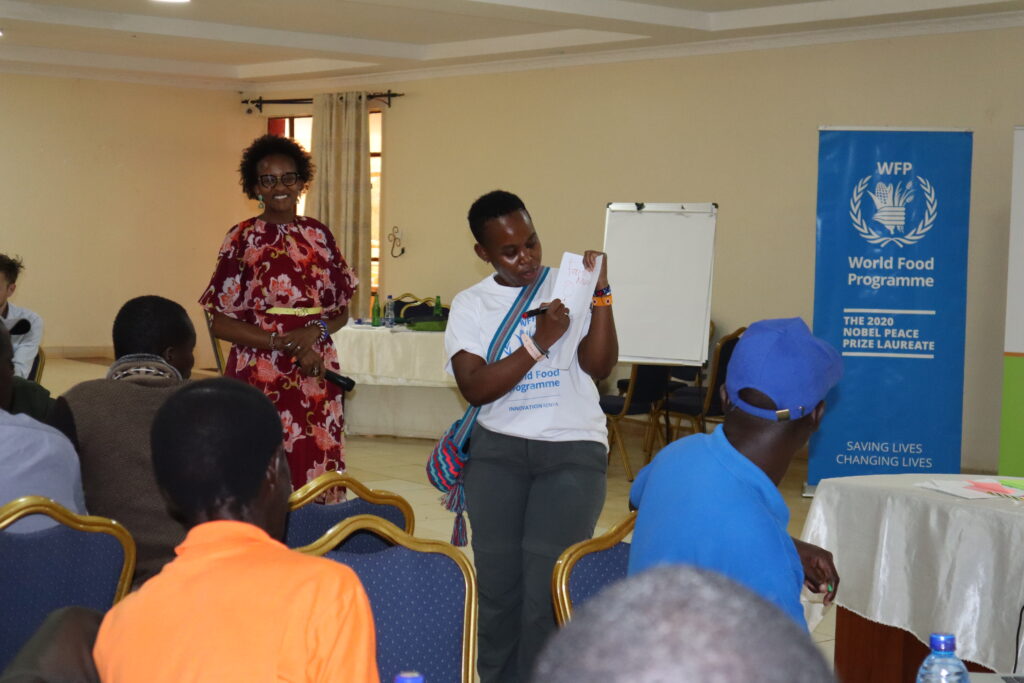
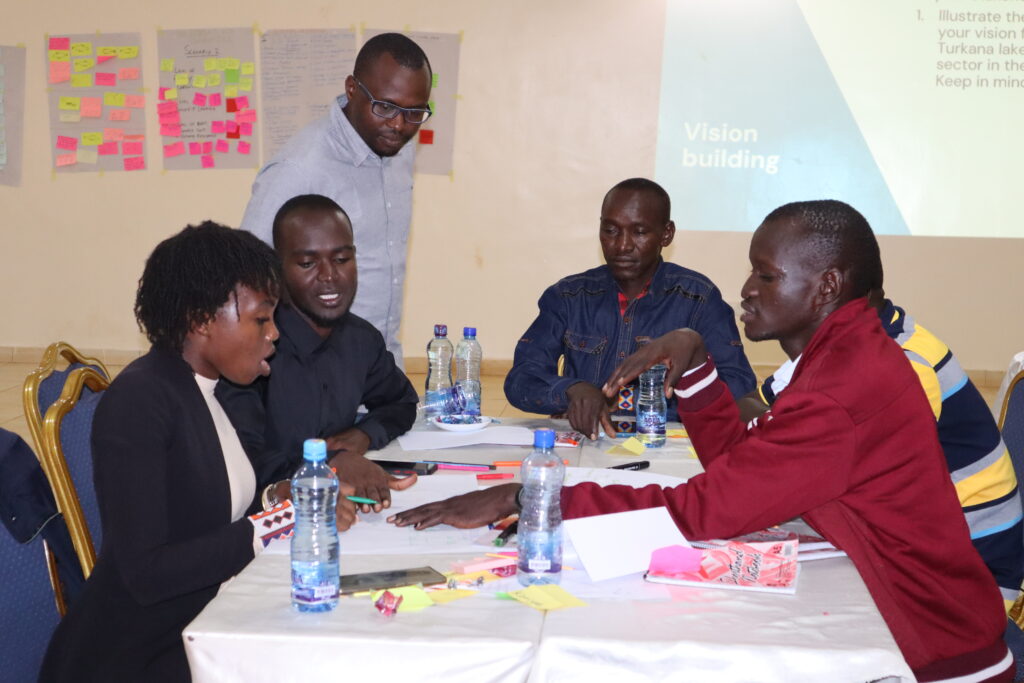

At the end of the workshop, I felt highly positive about these fruitful discussions that enabled participants to think about what might happen to the Marsabit food system in the years to come, and what factors would influence these changes. In addition to that, the insights gathered through the multi-stakeholder forum are expected to not only support the inception phase of the programme but will also support multi-stakeholder engagement throughout the programme.
The Foresight4Food FoSTr team will continue to support the World Food Programme team in realizing the ‘Sustainably Unlocking the Economic Potential of Lake Turkana’ programme inception phase. A follow-up workshop will take place in Turkana County from March 25 to 28, with stakeholders from that side of Lake Turkana.